#programmers musicians etc
Note
yo omg would you ever make a game??? the thought of a game with your art makes me go ❤️💖💞❤️💕💞❤️💖❤️💕💞❤️💖
AHHH maybe i should shout louder about my projects because
I AM MAKING A GAME!!!!
I've been working on it for what feels like forever now - I can only work on the (absolutely terrifyingly monilithically huge) list of art assets in my free time when I'm not doing commissions, shop stuff, or any other money making venture, BUT IM DOING IT!!!
I only really talk about Last Sprout on Patreon, just because of how early into the project we are, but I promise you there'll be stuff to share soon. I'm hoping the first quarter of 2023 there'll be.... something for you guys. perhaps something,,,, playable ????
I've been working so so hard on the art - I actually am sat on a little mountain of stuff that I haven't even uploaded to patreon yet that no one has seen, but theres so so so much.
If you're interested, here's some stuff I've posted publicly!
The denizens of the THESPA-02
Some lore about those very robots
An Inventors Blade
The first batch of concept art for the game
This doesn't look like much but I promise there is a WHOLE bunch over on Patreon you can all see at the £1 tier! And, like I said, a really large amount more coming soon. I could talk about this project for hours and hours and hours so I'm going to leave it there but - I'M MAKING A GAME !!!! I hope ur all as excited about it as I am!
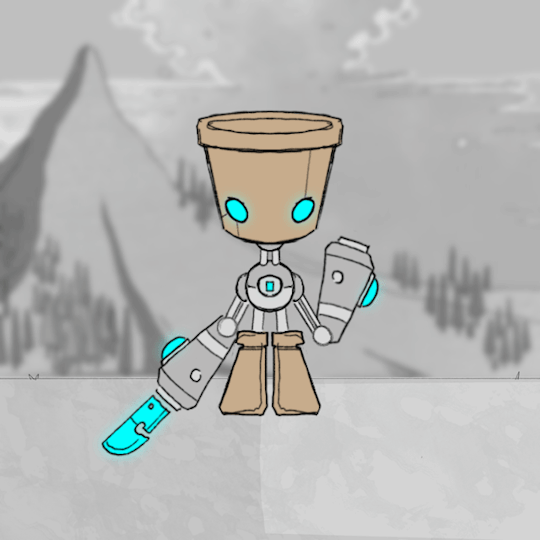
#🌱#<< you can look at that tag on both my tumblr and patreon to see stuff!#alsopls dont be put off by the scifi - this is a fantasy game !!#yes plenty of robots but id def list it as a fantasy game ! dragons and knights and heroes#gosh thank u for the ask heheh#im gonna ramble here actually nobody can stop me#im getting there! first step is a workable prototype - i have almost all the art done for that!#when i get the art done I need to contact my various collaborators#programmers musicians etc#then we start to put the pieces together !! and literally !! that is not far off now !#ive done animation sets for not only our sproutly protagonist but the first enemy of the game#and im working hard now on UI stuff (upgrades menus etc)#but !! its happening its happening !!
192 notes
·
View notes
Note
Caine x Reader 🪩🎼
"It's Best for my Learning" - Caine x Reader

TW: None I think.
Type: Fic; romantic. Emoji details: 🪩 (Mirror/Disco Ball) Dance, 🎼 (Musical Score) Music activity
A/N: If you don't specify whether romantic, platonic, etc. I'll just choose what I want by the way. Reader is an advanced (well not really) AI like Caine; they're a helpful assistant that never got past beta testing. I'm not well-versed in characterising Caine yet. No spoilers I think.
Everyone knew what was going on.
Ever since Caine had found you deep in the void, he never acted the same. Mostly because you followed him everywhere, glitching out and asking him questions. He answered every one, no matter how basic or complicated. That itself wasn't too unnatural, but there were other things he did that were.
He was more snappy with Bubble when it was making ridiculous questions (some of which you would ask very similar ones without a problem) and interrupted him or was in general a nuisance. And he was more snappy with the circus crew, too. When they complained about him or the circus in front of you he'd try and "forcefully encourage" them to be more cheerful.
It didn't take much for them to put two and two together and know it was because you were there. Zooble was the one who figured it out first, and was a bit surprised that it took a bit longer for some of the others to work it out. Little ol' Caine had fallen for the broken and rejected helper AI.
Your purpose as an AI was to be of an assistant to Caine, though you never made it out of beta testing clearly. Janky and clueless, you'd ask the most basic questions like what a chicken was. Caine would give you an in-depth explanation, slowly providing you with all the information your programmers couldn't care to give you. He'd shut up Jax when he made a mean comment, not caring if your programmed personality made it so you didn't care.
One day, as Caine was coming to the end of his list of activities, he held a suggestion box for the circus members to submit ideas. Gangle had mentioned to Ragatha what a fun idea it'd be to have a dance and force Caine and you to dance together. Little did she know, Ragatha would love the idea and convince everyone else to go along with it.
Soon, the night of the performance was coming up. Caine had gotten everyone practicing different instruments and styles like contemporary, jazz, and traditional waltzes (much to the dismay of some of the crew). He was quite happy with their obedience and clueless to their plans. You watched on happily, trying to join in every now and then with some of the members to learn more technical skills.
When the nighttime came and the performance was due to start, you and Caine took your seats near the front of the stage. The performances went by as smoothly as a band of mostly inexperienced musicians could. But just as Caine was getting up to congratulate everyone on their effort, Ragatha got up out of her seat and headed to the front of the stage.
"Now, I'd like to invite Caine and our lovely AI assistant up to the stage for a surprise performance!" She gestured her arm towards you both.
Confused--but still clueless--Caine got out of his seat and headed to the stage. You followed close behind. Caine looked around, seemingly unable to make eye contact. It was only made worse as the band started playing a slow-dance song.
"Oh! A slow-dance song," you exclaimed. "I'm yet to learn the dance to these."
"Right! I must have forgotten to teach this!" Caine replied. "Well, I better remember to do it next time. Bubble, make note of this for me--Bubble?" He looked around the room to find Bubble turning to face him, face stuffed with food from the buffet.
"Sorry, boss!" it said.
Caine rolled his eyes. With a chuckle, you took his hand in yours. His head of teeth shot to face you, pupils small.
"It would be more beneficial to my progress to learn it now," you said, voice monotone as ever.
He cleared his throat, saying, "well, if it would help..."
Putting his arm on your waist, you put your hand on his shoulder. Hand in hand, you slowly started to sway from side to side. You could hear giggling off to the side; looking over, you saw Ragatha trying to keep her cool on the grand piano. Jax was smiling wide, too, as always. Even Bubble had moved over from the buffet to dance along out of time.
"So!" Caine started.
"So?" you replied.
"I need to talk to you after this."
"What about?"
"Yeah," Jax butted in, "what about?"
Caine shot him a look.
He said, "I'll tell you after."
As the song came to a close, the two of you let go of each other. Caine was quick to do so, wiping his gloves on his suit pants as if they were sweaty. Leading you past the group of smiling crew, he took you backstage to talk to you. The lights were off, the only light coming from the stage half-blocked by the curtains. Yet despite being away from the stage, you could hear close giggling from the other side as Caine opened his mouth to speak.
"Would you like to go on a date with me?"
#amy's writing#50 follower event#anonymous#the amazing digital circus#tadc#tadc x reader#x reader#tadc headcanon#tadc caine#tadc caine x reader
163 notes
·
View notes
Text
Games Report 06/20/23

Hello everyone! Before we get into the meat of this week's dev report, today's guest artwork of Shaun Durand-Coffer and Moon Pie is by Coda Blue, a black games developer we commissioned to commemorate Juneteenth 2023!
We're also breaking a bit of convention today: it’s Sauce here to do some talking about a frequent (and valid) concern/question we get from fans.
Why so many projects at one time?
There are a lot of reasons that go into it and it’s kind of difficult to break down casually. But I’ll do my best to use the analogy of a relay race with batons!
Each project (Sunny Day Jack, The Groom of Gallagher Mansion, AphroDesia, and DacahaBo) largely has its own team, meaning that Writer A is assigned to Project A while Writer B is assigned to Project B and so forth. In a single Project, when the Writer is done with the script, they pass the baton to the Artist (usually me, in this case) to draw additional art like CGs to accentuate key scenes, while an Editor works to tighten up the sentence structure and spot missing plot points (a Musician may be working at this time as well). After editing is complete and art is at least underway, Programmers and Voice Actors can begin on their tasks. As we near completion, Programmers, Audio Engineers, and Beta Testers make sure the package is nice and tidy for everyone to enjoy.
At least, that's how it goes in an ideal situation.
When you’re working on a production, a large amount of variables (defined as an "element, feature, or factor that is liable to vary or change") are in play. Some of those variables might look like:
When does this team member get off from college, their day job, or other life commitment?
When they're done with those, how much personal time do they need in order to take care of themselves, or even recuperate?
What happens if the person actively working on something has a chronic illness flare-up, gets sick, or has something else preventing them from doing their assignment?
What happens if this person isn't openly communicating about delays in delivering work?
What happens if we can't contact someone because they're not responding to our inquiries?
What if we need to remove someone from the team, or someone we were counting on leaves voluntarily?
What happens if work that was "completed" and already paid for needs to be scrapped entirely and redone from the ground up?
Does someone else from Project C need to fill in and work on Project A to help them catch up?
Does someone assigned to one role in a Project need to take on multiple roles to help the entire team catch up?
Even from this short list of potential hurdles we might face during production, it seems like an easy solution would be to eliminate someone's time spent on outside life commitments! Except, it's not: even BáiYù can't quit his day job because in America, traditional employment often offers healthcare as part of their employee benefits and SnaccPop Studios is nowhere close to being able to provide a full living wage for everyone working with us. Maybe one day! But we’re not quite there.
So as you can imagine, sometimes there will be periods of time when an entire group of people aren't working because they don't have the baton quite yet since the person holding the baton is being held up by life. And this isn't their fault by any means, but a lack of communication about that makes it harder for us to estimate when any single relay race will be complete.
So how do you keep a Patreon filled with content?
We are very fortunate and grateful to receive a lot of Patreon support, especially after our SDJ Kickstarter! But getting all those funds is a huge responsibility. You should attempt to keep it stocked. And that’s what we attempt to do.
SP is made up of different teams suited to each individual property. Different programmers, different writers, etc. Each team is tasked with getting a set amount of work done, and between all the variables listed above sometimes we have really good months and sometimes we have pretty dry ones. Keeping all these teams moving together helps us to put out content while say, a writer is out with COVID and SDJ needs to pause for a week. TGoGM had a technical error that saw the game needing to be rebuilt in a new engine. And at the moment, AD is currently sans an audio drama writer.
These are frustrating problems and we're working on fixing what's in our direct control. But we understand that we also have to USE the money we receive visibly or else people ask us where the money is even paying for. And while we make an effort to put away savings responsibly, we can’t just accept large amounts of money without providing a product, or portions of one, in return.
The "Boring Bits"
There’s also in productions portions I like to call “Boring Bits”. These are moments where everything being done is just exceptionally boring to show off. Either it’s programming and bug fixing, or it’s deep lore writing and scripting we can’t show due to spoilers, or something else like that.
At those times all we CAN say is we’ve been fixing bugs or writing. BáiYù and some of the other team members could give an explanation of what's going on during those times but most of us can agree that it's not as enjoyable as something like a new pin-up or an audio drama.
Sometimes to say more would be a spoiler, or we can’t say anything else. Sometimes, it's all a waiting game.
At the beginning, waiting was the hardest part. It could take anywhere from two weeks to months to get back recordings or audio or art. And we have to respect why these things happen. When it’s an instance of slow delivery, we can ask for more clear deadlines or pay a rush fee, but other than that it’s just a long wait.
So, while we waited, we tried to find other means of providing entertainment.
Productions featuring groups of people all over the world, with very different lives, is extremely difficult. But sometimes people who provide quality work require that bit of patience.
So where is everything in the relay race?
At the moment, the status of our projects is as such:
Sunny Day Jack
SDJ is still being mapped out due to the inclusion of Nick as a love interest, as his character becoming more permanent changes several things in the narrative with the other love interests. To help speed things along, we've asked Gil Finnegan (he/him) from the DachaBo team to work with Biscuwuit to split the character route workloads.
It’s a large game, and their work includes labeling every individual scene as well as planning all the programmable variables. We can’t share ANYTHING more than what we have already shared on Kickstarter and Patreon. No new art assets are prepared because they’ve either been made (BGs, GUI) or we don’t how many sprites we need for the full roster until the plot is reworked completely. We can’t give script pages because of spoiler reasons.
We anticipate that a more robust report cycle will begin appearing once we get to scripting, but as a VN writing is a heavy and very important portion of the game that requires this narrative planning, sensitivity editing, and retcon checking. We will likely be in the writing portion a lot of 2023, which was expected since the game is intended to release in 2024.
Sleepy Time Jack
STJ is our additional companion app that’s seeing its final updates with the Patreon Exclusive “Jacktor” portion currently in progress. Due to some less-than-ideal cloud storage issues, we had to remake certain assets from scratch. Additionally, Steam is currently giving BáiYù the runaround and making it difficult for him to get the page up publicly, but we think we've figured out why they're complaining about the logo (they seem to be afraid of the "Digital Talking Body Pillow" subtitle not being part of the app's name in the system).
The Groom of Gallagher Mansion
TGoGM is expected to be finished soon, with free NSFW content planned for the future, but not until we’ve given it some time to sit. BáiYù has had to not only perform his usual Producer duties across all of SP, but also take on Writer and Programmer duties in this project to keep it moving due to life circumstances surrounding team members.
DachaBo
DachaBo Classic is being maintained canonically and updated by a largely separate team, but mostly only as a cosmetic and stability update. DachaBo: Barks & Mews proper remains in pre-production (Planning lore, connecting dots, and conceptualizing) until TGoGM sees its first release in English.
AphroDesia
AD is currently planning its audio reboot. But as a lore-heavy series, it’s being taken under consideration very carefully. Audio drama writers are key, and our current writer is prioritizing living expense-crucial work.
The "Re-Pilot" has a full outline written that is about seven pages long, with a script to follow after. Priority will re-shift back to this project once TGoGM and STJ are out the door, with a slowly metered development since it is an audio drama/planned comic. This production is more about assigning duties and waiting than any other task.
What about other projects?
Anything else besides these projects and the Bachelor of the Month series (currently on hiatus) is not an official SP project, and funds do not directly contribute to those projects, as they’re considered personal items by individual members.
As has been mentioned before, I (Sauce) also make personal works. And that’s part of why I’m the one handling this.
Many people still consider me a part of SP from a heading POV. But part of why I stepped down as "Boss" was because at the moment I’m juggling a college education, full or part-time employment, and healing from years of untreated mental health. It was no longer feasible for me to manage all of these things.
BáiYù instead is compensated to handle the business aspects, and is more capable to do so at this time. I help with Patreon art, tier rewards, and additional creative work while he's been the one writing the majority of the updates and dev reports. I also work on SDJ sprite art, and additional art assets (Steam page, GUI, graphics, etc.) but with my free time I have begun to prioritize taking moments to relax with some non-game art.
I have noticed people saying my work outside is SP work, or attributing it as such. I attempted to even use a separate alias to separate the two, but I guess my style is recognizable to a degree and tried to make the best of it by declaring otherwise myself.
Anything not SDJ, STJ, TGoGM, DB, AD, or BotM is not property of SnaccPop Studios. I've invited some of the individual team members to talk about the projects they do in their free time or as parts of other game studios as SP has a wonderful platform thanks to all of you, but always be sure to look for the official SP branding or else risk accidentally affiliating unrelated work with us.
That is such the case for me, and it could very well be that way for anyone else.
In conclusion...
At the end of the day, SnaccPop does its best to balance a busy, worthwhile Patreon and quality projects done by persons whose individual circumstances are acknowledged and respected. And we understand that a lot of things at once can look flighty and unfocused.
We really hope this breakdown helps, and we apologize for any issues that not having one up prior may have caused!
Making art is messy. Confining creative and quality visions to jobs and roles can be at the best of times spontaneous. But we’re happy to be able to employ or use our funding to pay and contribute to the lives of many different types of creatives in many different lifestyles.
Again, here's how our projects are looking:
SDJ is on track to arrive in 2024.
STJ and TGoGM are in their final stretches with more content to come after.
DB Classic is being stablized before wide release while DB: Barks & Mews is in pre-production
AD is in pre-production, but the personal circumstances of a key writer are making it a bit difficult!
Thank you all for taking the time to be a part of this! Literally, we could not even do that without you all. This is a privilege we take very seriously. And we’re working very hard behind the scenes to keep you updated, our team members with any work we can provide, and patrons entertained longterm and short term.
#the groom of gallagher mansion#visual novel#somethings wrong with sunny day jack#sunny day jack#minors dni#sdj#dachabo#indie games#game development#snaccpop#snaccpop studios#aphrodesia
335 notes
·
View notes
Text
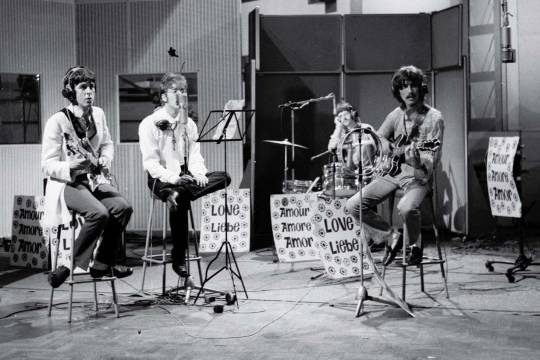
Derek Burrell-Davis - memo to BBC (May 67): “I had a satisfactory two-hour meeting with all four members of the Beatles Group this evening…..I don’t think it is over-stating it to say that they are enthusiastic about their participation in the ‘Our World’ programme and fully aware of the responsibilities they carry. Their approach is extremely professional and they are in complete agreement with the basic idea, which is that they are undertaking a recording session in the Number One Studio at E.M.I., Abbey Road. They cannot yet forecast what they will be doing in any great detail, but they propose writing a new number. Since this number will be heard in 30 countries, they are going to write the lyric in basic English. They suggest that they should use such words as “Hello, love, you, me, us, them, together, we”. They are wondering if it might be possible to use some of those words in different languages and are receptive to the idea that words such as “love”, “together”, etc. might be shown on large cards at appropriate moments in several languages”.

The BBC/broadcasters briefing meeting on 4 June 1967 to co-ordinate the international co-operation for the Our World Broadcast

The lyrics sheet given to the cameramen before broadcast. They were not impressed. On being told the Beatles wrote the music, they only asked "did they write the words as well?"

“...the day before, the doors were thrown open for a free-for-all picture session, at which I managed to have a quick word with —
PAUL: Someone’s just asked if I’m leaving the group. And there seems to be another rumour I’m moving. Both are very wrong. I’ve just finished my house and like it a lot. No, I haven’t bought a kilt yet.
GEORGE: We will do a TV show before we do a film. Nothing new to tell you about the film project. No script yet.
RINGO: My garden is looking great now. Got some of my building men to help the gardening contractor and everything’s okay.
JOHN: This song will be our next single. This TV show will give it a nice send-off.
Indeed, with some 6,500 TV workers and 1,000,000 miles of telephone wire working for the disc, it couldn’t be bad!” - - Andy Gray, NME
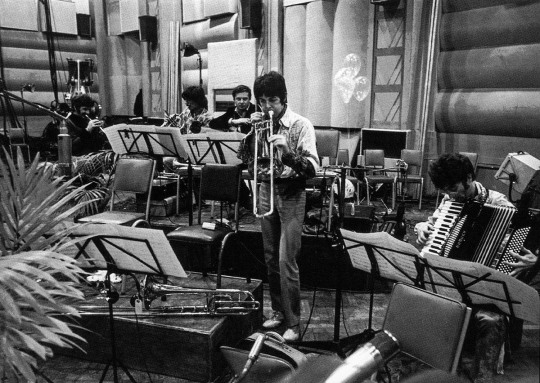
“When the musicians and TV crew took a meal break the Beatles tried out the musical instruments left lying around [...] Ringo and George try the trumpets, whilst Paul has a go at the trombone and John plays Jack Emblow’s accordion. In the background, in the left side far corner, the large weight box on the back of the Mole Crane is visible, with one of the white painted Murphy TV monitors on its trolley over on the right of the picture.” - - David Taylor, Postfade


“The BBC want a live trail”, Derek told me suddenly over my intercom. No one knew this had been planned, in fact to this day few people seem to know that such a promotion ever took place. [...]
“I had a few words with each of them in turn. What was the song called? Whose idea had it been? (“His”, they said, pointing to each other). And then I put the question to John that was intriguing me. Ninety-five percent of all popular music is in 4-time, but there was more than a hint of unfamiliar 7-time in “All You Need ls Love“.
“Did you know your song was in 7-time?” I asked.
I still remember the cool, serious look he gave me as he replied, “Yes, I know”.
Then he indicated Paul, adding “- but blame him”.
“Paul himself, alert as ever, noticed how, against my own instincts, I was trying to inject some breezy gaiety into the proceedings. He spoke encouragingly in my ear. “Yock it up, Steve ! ” he said. He knew that it was my preference to be in the narrator’s box doing a technical job, rather than “yocking it up”. I duly yocked.”
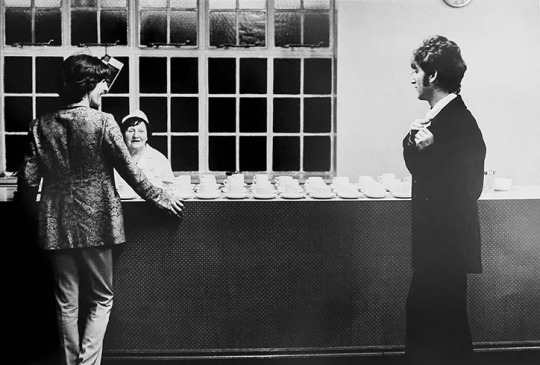
“This was the biggest group in the world, but when they went to the canteen, it was just four guys having a cup of tea. Underneath it all, these were ordinary guys who were in a band.” - - David Magnus (photographer)

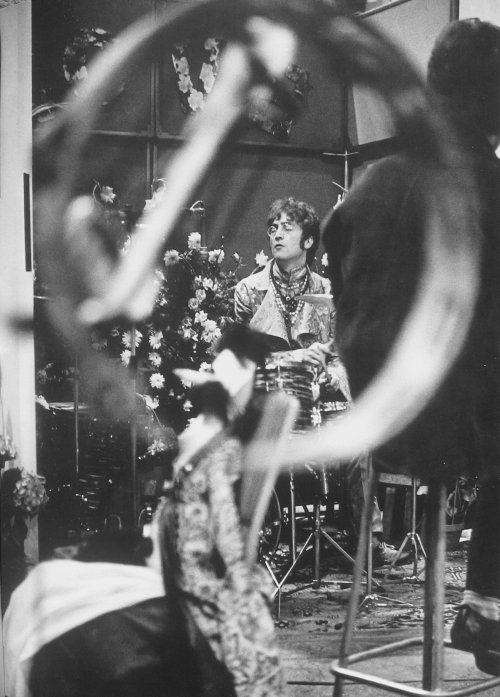

“There was a real party atmosphere, similar to what we had witnessed during previous real ‘happenings’, but Richard and I were struck by how visibly nervous John was, which was quite unusual for him: we��d never seen him wound up so tightly.” - - Geoff Emerick
“I did sense that John in particular felt rather apprehensive the nearer to transmission we got. However George seemed to be enjoying the moment, while Ringo and Paul showed no apprehension whatsoever.” - - David Magnus
______________________________
Almost this entire post is stolen from postfade.co.uk, written by David Taylor. It's a wonderful write up because it's only actually interested in the cameras used and the technical setup, but it's so interested in those that it covers every moment in glorious detail and pulls together lots of quotes. If you're interested in the ins and outs of outside broadcasting, oh my. There's a cut out diagram of the OB scanner van, and they've taken the video of the entire broadcast and marked up up to show the different camera shots and cuts and equipment used. There's a bit where they read in a book that some of the broadcast wasn't live, and so the author tracks down who wrote that and he says he copied it from Mark Lewisohn, so they track down ML and ask him why he wrote that and ML can't remember but says 'I wouldn't have written it down if there wasn't evidence for it', which they think is a bit weak, so they decide not to believe it. It's nice to see them belittling ML's lifework because they want to believe in the magic of live outside broadcasting, the same way we do when we want to believe in love.
#long post#sorry I guess#beatles day#all you need is love#love love#I love how much the cameramen were given that lyric sheet#and were just like what the fuck even is this????#<333333#the beatles#john lennon#[]
144 notes
·
View notes
Text
Most Essential Vocabulary #2
Part 2 of Most Essential Vocab, as always I’ll include notes when I think something needs more explaining and I’ll point out regionalisms when I know them.
And if anyone has any alternate words/regionalisms they know of for things, please let me know - it helps me and everyone else too!
...I also REALLY overdid it with the food categories, but it’s pretty much the majority of things you can find in a grocery store, market, or supermarket as far as food... except for more specific things like names of fish (which I don’t always know myself, and isn’t THAT essential unless you go to the fishmonger a lot)
-
Occupations [Los Oficios]
I’ll be including the male and female forms of things - anything with just one form is unisex
Note: Pretty much anything with -ista in it is unisex, even if it ends in A; as an example el artista or la artista.
trabajador, trabajadora = worker [n]
trabajador(a) = hard-working [adj]
abogado, abogada = lawyer
abogado/a defensor(a) / la defensa = defense lawyer / defense
fiscal / abogado/a de la acusación = prosecutor
[generally in a trial it’s the abogado/a “attorney/lawyer” or la defensa as a general term, and then you have el/la fiscal “prosecutor”... who is also technically abogado/a but a different function]
doctor, doctora = doctor
médico, médica = doctor [specifically medicine]
maestro, maestra = teacher [lit. “master”; it is often used with teachers that cover multiple subjects and pre-college/university... usually a maestro/a tends to teach younger children, or they’re a “master” or “teacher” in martial arts or music]
el profesor, la profesora = professor [more common in university and for people who are more experts or who have specialized learning degrees]
hombre de negocios, mujer de negocios = businessman/businesswoman
artista = artist
músico, música = musician
[not to be confused with la música “music” by itself which is a noun]
dentista = dentist
sastre = tailor
albañil = builder, construction worker
[lit. “bricklayer”; this is sometimes the word for “mason” and general construction work and those working with stone, brick, or cement]
contratista = contractor
granjero, granjera = farmer
cocinero, cocinera = cook
chef = chef
camarero, camarera = waiter, waitress / server*
mesero, mesera = waiter, waitress / server [more Latin America]
panadero, panadera = baker [specifically el pan “bread”]
pastelero, pastelera = baker [specifically cakes or pastry; as la pasta means “dough/pastry” and los pasteles are “cakes”]
carnicero, carnicera = butcher
cazador, cazadora = hunter [la cazadora could also be “huntress” if you’re feeling fancy]
leñador, leñadora = woodcutter / lumberjack, “lumberjill”
mago, maga = magician [or “mage” if you’re playing an RPG; usually mago/a in the real world means someone who does illusions or card tricks etc]
científico, científica = scientist
químico, química = chemist [someone working with chemicals]
farmacéutico, farmacéutica = pharmacist / chemist [UK]
biólogo, bióloga = biologist
pescador, pescadora = fisher
marinero, marinera = sailor
cartero, cartera = postal worker, courier, “mailman” / “mailwoman”
soldado = soldier
atleta = athlete
nadador, nadadora = swimmer
jugador / jugadora (de algo) = player (of something)
[in some contexts el juego “game” or jugador, jugadora can be “gambling” and “gambler”]
futbolista = football player / soccer player
beisbolista = baseball player
luchador, luchadora = fighter / wrestler
electricista = electrician
informático, informática = computer tech, IT [internet tech] person
[la informática is the general word for “computer sciences” - so anyone who deals with computer things is often called informático/a]
programador, programadora = programmer
plomero, plomera = plumber [Latin America in general]
fontanero, fontanera = plumber [Spain and parts of Mexico and Central America]
gasiftero, gasfitera = plumber [parts of South America]
técnico, técnica = technician [also sometimes someone who repairs things; it’s not just “tech expert”, it could be very widely applied]
policía = police officer
autor, autora = author
escritor, escritora = writer
dramaturgo, dramaturga = playwright
actor, actriz = actor / actress
[sometimes actresses use actor for themselves as a way to distance themselves from the gender of it all; but in general you see actor/actriz and los actores “actors”... saying las actrices specifically refers to “actresses”]
poeta, poetisa = poet [we rarely use “poetess” in English today but it exists]
escultor, escultora = sculpter
pintor, pintora = painter
contable = accountant [I think Spain]
contador, contadora = accountant [more Latin America; lit. “counter”]
político, política = politician
juez (sometimes jueza in feminine) = judge
banquero, banquera = banker, bank worker
cajero, cajera = cashier / clerk / teller (at a bank)
[cajero/a really means “someone who operates the cash register” but la caja “box” is also applied to la caja fuerte “safe” or “strongbox” so it applies to bank tellers as well; anytime there’s a cash register involved, you’re probably dealing with a cajero/a]
dependiente, dependienta = retail worker, sales clerk
el dueño, la dueña = owner / landlord, landlady
propietario, propietaria = owner, property owner
jefe, jefa = boss
asesor, asesora = consultant
consejero, consejera = advisor, consultant, counselor / councilor (someone serving on a council)
gerente, gerenta = manager
manager / mánager = manager
empleado, empleada = employee
*Note: camarero/a by itself is often used as “waiter/waitress” but in some places it means “maid” as in the person who cleans up rooms in a hotel. This is because camarero/a originally meant “chamberlain” related to la cámara “bedroom/chamber” or la cama “bed” - a camarero/a would attend to someone like their personal servant and in older works it meant an adviser or someone who oversaw an important person’s appointments and sometimes coordinated their outfits or oversaw the other staff.
It came to be “waiter/waitress” in inns and hotels and the noble houses where someone might be coordinating your sleeping arrangements and also making sure you were fed, possibly serving you themselves
Today, camarero/a is often your “server” in (I think?) Spain, but in other places they’re the people cleaning up after you at a hotel. To the best of my knowledge, the cleaning crew is typically el criado or la criada “servant” - but often la criada means “maid”, both in history and today............. and outside of Batman you rarely are going to see el mayordomo “butler” used, but just in case, there it is
The term mesero/a is directly related to la mesa “table” so they’re specifically the person bringing things to and from the table which no added meanings. To the best of my knowledge this is more common in Latin America; and your camarero/a is probably the cleaning crew
*Note 2: The word músico/a for “musician” is the umbrella term. Most instruments have their own word and frequently end in -ista... such as pianista “pianist”, flautista “flautist” / “flute player”, or baterista “drummer”, as well as guitarrista “guitar player” and bajista “bass player”
You’ll find more specific terms for specific sports, activities, and other skills. Many end in -ista, and some like martial arts have specific works themselves
~
el oficio = occupation / job, job title
el puesto = position
el hueco = vacancy [lit. “a hollow/empty spot” or “gap”; can refer to jobs or empty spaces in schedules/calendars, or it can mean “a hollow” of a tree or a “gap” in something]
el trabajo = job / work
la labor = labor, work [used both for working hard and childbirth]
trabajar = to work
laborar / laburar = to work [regional; especially common in South America or Río de la Plata]
el tajo = “work”, “workplace” [I think this is regional; lit. el tajo is “a slice” or “slash”]
la oficina = office
el bufete = firm [usually law firm]
la compañía = company
la empresa = enterprise
el despacho = office (someone’s personal office; usually for teachers or bosses; this is not the “office” you typically work in, this is someone’s private workspace)
Also worth pointing out - somewhat related - that a “doctor’s office” is frequently el consultorio. It’s specifically the place you go to for a consulta “examination” or “medical exam”; so it’s more the actual building. In some places you will see “the doctor’s” referred to as la clínica “clinic” or “doctor’s (office)”; and in some places el hospital although this is very regional as sometimes el hospital or la clínica can carry different connotations of being privately owned or not
-
Buildings and the City [Los Edificios y la Ciudad]
el edificio = building
el rascacielos = skyscraper [lit. “scratches skies”]
el pueblo = town / population (people)
la aldea = village, small town
la ciudad = city
la calle = street / road
el callejón = alley
el coche, el carro, el auto = car
[all are regional, all make perfect sense to everyone but they are regionally preferred - Spain tends towards coche, Latin America in general prefers carro, and parts of South America use auto]
la carretera, la autopista = highway
la acera = sidewalk
[semi-related la acera is also used in many expressions related to sexually; ser de la otra acera or ser de la acera de enfrente tend to mean “to play for the other team” as in “to be gay”, and literally they mean “to be from the other sidewalk” or “to be from the opposite sidewalk”]
la escuela = school
el instituto = institute / high school [regional]
el colegio = high school [regional]
la universidad = university, college, academy
el banco = bank
[el banco can also be “bench” in some places]
el mercado = market, marketplace
el supermercado, el súper = supermarket
la biblioteca = library
la farmacia = pharmacy
la droguería = pharmacy [regional]
el hospital = hospital
la clínica = doctor’s office / clinic
la estación = station
la estación de tren = train station
la estación de policía / la comisaría = police office
el andén = platform
el ayuntamiento = town hall, city hall
la iglesia = church
el catedral = cathedral
la mezquita = mosque
el templo = temple
la sinagoga = synagogue
el parque = park
el parque de diversiones = theme park
el monumento = monument
la galería (de arte) = art gallery
la peluquería = hair salon, hairdresser’s
el bufete = law firm
la oficina = office
la fuente = fountain
la estatua = statue
el aeropuerto = airport
el puerto = port
el barco = ship
el muelle / los muelles = docks, wharf
el autobus, el bus = bus
el taxi = taxi
el restaurante = restaurant
el café = cafe
la granja = farm
la finca, la hacienda = estate / plantation [sometimes “farm” but in the sense of “this is the main house on the farmlands”]
la pastelería = bakery (cakes/sweets)
la panadería = bakery (bread)
el centro comercial = shopping center / mall
la librería = bookstore
el castillo = castle
el palacio = palace
la fábrica = factory
el taller = workshop / art studio
el estadio = stadium
el correo / los correos / la oficina de correos = post office
[kinda regional, but el correo is “mail” so it all makes sense regardless]
la tienda = store
[la tienda literally means “tent”, so you will see it as la tienda de camping “tent (for camping)” as well; this is because people’s shops used to be outside and covered in awnings or tents, or they could be mobile and they’d set up tents to sell goods]
el almacén = department store [lit. “warehouse”]
el museo = museum
el teatro = theater
el cine = movie theater, “the movies”
el acuario = aquarium
el planetario = planetarium
el observatorio = observatory
la torre = tower
la fortaleza = fortress
el portal = gate [or “portal”]
la puerta = door
la ventana = window
el cristal = window
[lit. “crystal”, but el cristal is commonly used for “a pane of glass” and “windows” in general; it may also refer to “glass” in general... the other word for “glass” is el vidrio which is sometimes more formal or the material, but el cristal can be the glass part of clocks, watches, compasses, etc]
la casa = house
el hogar = home
-
In the Kitchen [En la Cocina]
la sal = salt
la pimienta = pepper
el azúcar = sugar
la miel = honey
el agua = water [technically feminine noun]
la grasa = fat
la harina = flour
la harina de maíz / la maicena = cornstarch
el ácido = acid
el aceite = oil
el aceite de oliva = olive oil
el aceite de girasol = sunflower oil
el aceite de cártamo = safflower oil
el aceite de sésamo = sesame oil
el aceite vegetal = vegetable oil
el aceite de cacahuete/maní = peanut oil
el aceite de coco = coconut oil
el aceite de aguacate = avocado oil
el vinagre = vinegar
el huevo = egg
la yema = yolk
la clara (de huevo) = egg white
la tortilla = omelet
[when it’s not the tortillas you see in more Latin American food, a tortilla refers to “omelet”; literally a tortilla refers to “turned/twisted” from torcer, so it originally meant something that was flipped halfway through, or partially folded]
la tortilla de papa / patata = potato omelet [EXTREMELY common dish in Spain]
la tortilla española = Spanish tortilla / potato omelet
la tortilla de maíz = corn tortilla
la tortilla de harina = flour tortilla
Vegetables [Los Vegetales]
los vegetales = vegetables
las verduras = vegetables, greens
la lechuga = lettuce
el tomate = tomato
la zanahoria = carrot
la cebolla = onion
el puerro = leek
el apio = celery
el ajo = garlic
el diente de ajo = garlic clove [lit. “tooth of garlic”]
la papa = potato = Latin America
la patata = potato [Spain]
(las) papas/patatas fritas = (French) fries / chips [UK]
[lit. “fried potatoes”]
la batata = sweet potato
el camiote = sweet potato [Central America]
el boniato = sweet potato [usually more Rio de la Plata]
la alcachofa = artichoke
la col / el repollo = cabbage
el brócoli = broccoli [has some other regional spellings like brécol or bróculi but generally the same sound-ish]
la coliflor = cauliflower
la col rizada, el repollo rizado = kale [lit. “curly cabbage”]
la berza = kale
la calabaza = pumpkin
el calabacín = squash / zucchini / gourd
la berenjena = eggplant, aubergine
el pepino = cucumber
el pimiento = bell pepper [regional]
el chile / el ají = chile pepper
el aguacate = avocado
el hinojo = fennel
la aceituna = olive [regional but the most standard]
la oliva = olive [regional]
el hongo = mushroom
la seta = mushroom
el champiñón = mushroom
[all regional but all mostly make sense to everyone else; I believe champiñón is more common in Spain]
el guisante, los guisantes = pea, peas
el nabo = turnip
el rábano = radish
la remolacha = beet
el betabel = beet [regional]
la betarraga = beet [regional]
la espinaca = spinach
Meat and Fish [La Carne y El Pescado]
la carne = meat / flesh
el pollo = chicken / poultry
el pavo = turkey
el puerco / el cerdo = pork [or “pig”]
el jamón = ham
la salchicha = sausage
el res / (la) vaca = beef [la vaca being “cow”]
la hamburguesa = hamburger
la ternera = veal
el bistec = steak
el lomo (de algo) = loin [usually el lomo de res or el lomo de puerco]
el solomillo = sirloin
el filete = fillet
la albóndiga = meatball [depending on region the exact kind differs, but in general las albóndigas are some kind of meatballs]
el conejo / la liebre = rabbit / hare
la rana = frog
el caracol, los caracoles = snails
el pescado = fish
el bacalao = cod
el salmón = salmon
la platija / el lenguado = flounder
el atún = tuna
la trucha = trout
la pez espada = swordfish
la perca = perch
el esturión = sturgeon
la merluza = hake
el abadejo = pollock
la anguila = eel
la anchoa / el boquerón = anchovy
la sardina = sardine
la almeja = clam
el mejillón = mussel
la ostra = oyster
el calamar = squid
el pulpo = octopus
la vieira = scallop [many regional names here, just saying]
el camarón = shrimp
la gamba = prawn, shrimp
[both generally mean the same thing, but they are more regional; a gamba is typically bigger in my experience but because they look the same they get used as the same general thing]
el marisco, los mariscos = shellfish, seafood
[general term; if you’re being specific, los mariscos mean “anything from the sea”, but if you’re differentiating fish and shellfish you use el pescado for “fish” and los mariscos for “shellfish”]
Dairy [Los Lácteos]
el lácteo, los lácteos = dairy products
la leche = milk
la nata = cream
la crema = cream
[more or less the same, but some places use one more than the other; everyone understands it though]
el queso = cheese
el yogur = yogurt
la mantequilla = butter
la manteca = lard
Starches and Legumes [Los Almidones y Las Legumbres]
el almidón = starch
el maíz = corn
la empanada = empanada / fried dumpling
[lit. “covered in bread”, so it can be many things that are covered in dough; I’ve even seen “pot pie” called empanada]
el pan = bread
la hogaza = loaf (of bread)
la miga / la migaja = breadcrumb
el trigo = wheat
la avena = oat
los cereales = cereal / grains
el arroz = rice
la pasta = pasta [sometimes “dough”]
el espagueti, los espaguetis = spaghetti
el ñoqui = gnocci
la lasaña = lasagna
los fideos = noodles
la legumbre, las legumbres = legumes
la lenteja, las lentejas = lentils
el frijol, los frijoles = beans
la habichuela, las habichuelas = beans
la alubia, las alubias = beans
la judía, las judías = beans
[they all kind of mean “beans”, it’s all regional but frijoles makes me think of Mexico or some parts of Latin America; typically they add a color to specify... so you might see las judías OR las habichuelas verdes for “green beans”, or you might see las habichuelas rojas or los frijoles rojos for “red beans” or “kidney beans”; everyone mostly knows what you’re talking about, don’t worry]
Fruits [Las Frutas]
la fruta = fruit
la manzana = apple
la naranja = orange
la mandarina = Mandarin oranges / oranges
el melocotón = peach [Spain]
el durazno = peach [Latin America]
la cereza = cherry
el coco = coconut
la piña = pineapple
el albaricoque = apricot [Spain]
el damasco = apricot [Latin America]
el chabacano = apricot [Mexico]
la uva = grape
la toronja = grapefruit
la fresa = strawberry [in general]
la frutilla = strawberry [in some countries; fresa in some countries can be “posh” or “rich”]
la frambuesa = raspberry
la mora = mulberry / blueberry [sometimes la mora azul]
el arándano (azul) = blueberry
el arándano rojo = cranberry
la baya = berry
el higo = fig
el dátil = date
el melón = melon
la sandía = watermelon
la ciruela = plum
la ciruela pasa = prune
la pasa, las pasas = raisins
[la pasa can refer to any kind of dried fruit, usually it’s “raisins” meaning la uva pasa “raisins” from grapes, or la ciruela pasa “prune” from plums]
el limón = lemon
la lima = lime
[sometimes it’s limón for “lime”; it’s very confusing and regional]
la banana = banana
el banano = banana [regional; sometimes “banana tree”]
el plátano = plantain / banana [regional]
Nuts [Los Frutos Secos]
los frutos secos = nuts [lit. “dry yieldings”; where fruto as “fruit” refers to anything that a plant produces or “bears”]
el maní / el cacahuete = peanut
la castaña = chestnut
la nuez = walnut
el pistacho = pistachio
el anarcado / la castaña de cajú = cashew
la almendra = almond
la avellana = hazelnut
la semilla = seed
la semilla de girasol = sunflower seed
la semilla de calabaza = pumpkin seed
la pipa = pumpkin seed [Spain; la pipa is just “pip” or “seed”]
la pepita = pumpkin seed [Mexico; it’s a specific type, but in general la pepita can be a pumpkin seed or a small seed]
la mantequilla/crema de (algo) = butter (of some kind)
la mantequilla/crema de cacahuete/maní = peanut butter
la mantequilla/crema de almendra = almond butter
Herbs and Spices [Las Hierbas y Las Especias]
la hierba = herb [or “grass”]
la hoja = leaf
el tallo = stem, stalk
la albahaca = basil
el laurel, la hoja de laurel = bay leaf, laurel
el perejil = parsley
el orégano = oregano
la salvia = sage
el romero = rosemary
el tomillo = thyme
el eneldo = dill
el cilantro = cilantro / coriander
la especia = spice
la corteza = bark (of a tree) / crust (of bread/cake)
la raíz = root
la canela = cinnamon
el jengibre = ginger
el clavo = clove [or “nail” or “hoof” in general]
la pimienta = pepper (spice)
la pimienta de Jamaica = allspice [lit. “Jamaica pepper”]
el cardamomo = cardamom
la cúrcuma = turmeric
la nuez moscada = nutmeg
el cilantro = coriander / cilantro
la (semilla de) mostaza = mustard (seed)
molido/a = ground
en polvo = ground [lit. “in dust (form)”]
el polvo de ajo = garlic powder
el polvo de cebolla = onion powder
el polvo de chile/ají = chili powder
el polvo de curry = curry powder
la paprika = paprika [often the Hungarian sweet kind]
el pimentón = paprika
[often the spicy Spanish kind, commonly the spice for chorizo, but pimentón can also be used for “bell pepper” in some places]
la sal = salt
la sal marina = seasalt
la sal en escamas = flakey salt [lit. “salt in scales”; the escamas are “scales” for fish or reptiles, but en escamas is often the term for “flaked” or “flakey”]
Other Things [Otras Cosas]
el condimento = condiment
la mayonesa = mayonnaise
el ketchup, el catsup = ketchup
la mostaza = mustard
la salsa = sauce / salsa
la salsa de tomate = tomato sauce
la salsa béchamel / el béchamel = bechamel sauce, cream sauce
la salsa de soja = soy sauce
la soja = soy
el vino = wine
el vino tinto = red wine
el vino blanco = white wine
el jerez = sherry
la cerveza = beer / ale
la mezcla = mix, mixture
la vinagreta = vinaigrette / salad dressing
el aderezo (de ensalada) / el arreglo (de ensalada) = salad dressing
[el aderezo may also mean “condiments” or “fixings” for other foods, but specifically for salads it’s “dressing”]
el puré = puree / mash, “mashed” / blended
(el) puré de papa/patata = mashed potatoes
(el) puré de manzana = applesauce [also la compota de manzana which is “apple compote”]
(el) puré de calabaza = pumpkin puree, mashed pumpkin
endulzado/a = sweetened
enchilado/a = covered in chiles, covered in a spicy sauce
batido/a = whipped / creamed / scrambled
[batir means “to strike” like “to slap”, or “to hit”; it could also be “stirred” and you may see it used along with agitado/a “stirred” or “shaken”]
relleno/a = stuffed
el relleno = stuffing / filling
en escabeche = marinated / brined, in brine
en salmuera = brined, in brine
[el escabeche is “marinade” or “pickling juice”, la salmuera is literally “brine” as in related to salt water]
hervido/a = boiled
adobado/a = marinaded (meat usually), covered in spices / spice rubbed
[el adobo can mean a few things but it’s often a spice mix of some kind, sometimes a brine or marinade]
frito/a = fried
horneado/a = baked (in the oven) [from el horno “oven”, but hornear is “to bake” or generally “to use the oven”]
al vapor = steamed [lit. “(cooked) in steam”]
asado/a = roasted / baked
tostado/a = toasted
dorado/a = browned [lit. “made golden” from dorar “to gild” or “to coat in gold”, but in cooking it means “to brown”]
estofado/a = stewed, simmered
al horno = oven-baked [or al forno for Italian things]
encurtido/a = pickled
los pepinos encurtidos = pickles [lit. “pickled cucumbers”]
el curtido = ceviche / slaw
[generally it depends, but a curtido is some kind of sour marinated dish, and it can be vegetables like “coleslaw” OR it could be some kind of ceviche; if you see a curtido just know it is generally acidic or pickled]
la milanesa = breaded cutlet [anything milanesa refers to something breaded and fried; la milanesa de pollo is “breaded chicken cutlet”, la milanesa de res is “breaded beef cutlet” etc]
el sándwich = sandwich [standard I think (?); sometimes it has alternate spellings/pronunciations]
el bocadillo = sandwich [Spain usually, specifically on a long piece of bread like a baguette; for everyone else this is “mouthful” usually]
la torta = sandwich [Mexico, specifically on a round roll]
el emparedado = sandwich [I think mostly Spain; it literally means “between walls”]
la masa = dough
el pastel = cake [regional]
la torta = cake [in Mexico a torta is a type of sandwich]
la tarta = tart, pie / cake [regional]
la galleta = cookie
la galleta salada = cracker [lit. “salted gallete”]
la tostada = toast (a piece of toast)
glaseado/a = frosted/iced
el glaseado = frosting/icing
la escarcha = frosting/icing [lit. “frost”]
[you may also see la cobertura “topping” OR el baño “bath” as frosting or icing, it all depends]
la confitura = jam, jelly, compote, preserves
la confitura de (algo) = (something) confit/compote/preserves
la jalea = jelly
la mermelada = jam, jelly, preserves, marmalade
la crema batida = whipped cream
el dulce, los dulces = sweet thing, sweets / possibly candy
la gomita = gummy candy
la golosina = candy [in general; kind of like the category like “confection”; all candies are golosinas really]
el chocolate = chocolate
la vainilla = vanilla
el helado = ice cream
dulce = sweet
agrio/a = sour, bitter
ácido/a = sour, tart
amargo = bitter, sour
agridulce = bittersweet, sweet and sour
salado/a = salty, salted
picante = spicy
[sometimes picoso/a or enchiloso/a though enchiloso/a to me implies a chile]
duro/a = hard
blando/a = soft
suave = smooth
espeso/a = thick [mixtures]
crujiente = crunchy
grasoso/a = greasy
aceitoso/a = oily
empalagoso/a, empalagante = cloyingly sweet, sickly sweet
seco/a = dry
mojado/a = wet
empapado/a = soaked, wet
el sabor = taste
crudo/a = raw
cocido/a = cooked
bien cocido/a = “well done” [for steaks]
Beverages [Las Bebidas]
la bebida = beverage, drink
el café = coffee
el tueste = roast [for coffee]
el tueste claro = light roast coffee
el tueste oscuro = dark roast
tostado/a = roasted/toasted
el té = tea
el té negro = black tea
el té verde = green tea
el té helado = iced tea
el té (de algo) = (some kind of) tea
el té de manzanilla = chamomile tea
el té de hierbas / el té herbal = herbal tea
el alcohol = alcohol
el trago = a shot (of alcohol)
(andar/salir) de copas = to go out drinking
[la copa is “wine glass”, related to the word “goblet”, so de copas is “out drinking” in a way]
el vaso (de agua) = glass (of water)
la taza (de té/café) = cup/mug (of tea/coffee) / teacup or coffee cup/mug
la copa = glass (of wine)
el refresco = soda [regional]
la gaseosa = soda [regional]
la bebida gaseosa = soft drink
la soda = soda [can also be “seltzer water” or “club soda”]
con gas = carbonated, “sparkling” [lit. “with gas”
sin gas = uncarbonated, “flat”
la cidra = cider
el vino = wine
el vino tinto = red wine
el vino blanco = white wine
el champán = champagne
la cerveza = beer
la caña = draft beer [at least in Spain; idk about everywhere else; lit. caña is “reed” or “tube” so it means it comes from a keg or spigot or something is “on tap”]
el ron = rum
la ginebra = gin
el vodka = vodka
el whiskey, el whisky = whiskey
el (whiskey) escocés = scotch [lit. “Scottish (whiskey)”]
la limonada = lemonade
el zumo = juice [Spain]
el jugo = juice [Latin America, usually]*
la pulpa = pulp
sin pulpa = no pulp
el hielo = ice
con hielo = with ice
sin hielo = without ice
sobre hielo = on ice / over ice / “on the rocks”
mezclado/a = mixed
*el jugo is used sometimes in Spain, often with “meat juices” and jugoso/a is still “juicy” in many countries, but it’s more common in Spain for fruit juices to be zumo... whether it’s zumo de naranja “orange juice” or zumo de manzana “apple juice” etc
Some common drinks to know: la sangría is “sangria” [lit. “bloodletting” related to la sangre “blood”] which is wine with fruit. Since sangria can be kind of touristy, some places tend to have tinto de verano “summer red wine” which is often cheap red wine and some kind of fruit soda like sparkling lemonade or orange soda. Another common one is la clara which is beer and sparkling lemonade [I think close to a “shandy” in English though lord knows I rarely call it that]
-
Meals [Las Comidas]
el aperitivo = appetizer
las tapas = tapas, appetizers [typically more of a Spain thing]
el plato fuerte = main dish, entree [lit. “strong dish”]
el plato principal = main dish, entree
la ensalada = salad
la sopa = soup
el caldo = broth
el estofado = stew
el desayuno = breakfast [standard, but also sometimes regional where desayuno might be very early or more sweet]
la comida = lunch / meal [in general]
el almuerzo = lunch [US/UK; for most other places it’s a midmorning meal]
la merienda = snack / teatime, high tea
la cena = dinner
el postre = dessert
la comida ligera = light meal
la comida basura = junk food
There’s so much to say about eating schedules in Spanish vs English but really your experience will be different depending on if the country has a siesta culture. Just know many of the words can be HIGHLY regional
In most Spanish-speaking countries la comida is “lunch” [lit. “food”]; but in the US we typically say el almuerzo as a meal that happens at noon. Depending on where you are your entire eating schedule is different but in the US we have three meals - el desayuno, el almuerzo, la cena. Your exact meal schedule will depend on the country you’re in
¡Buen provecho! = Bon Appetit, “Dig In” [said before eating]
¡Salud! = Cheers! [lit. “health”, said before drinking during a toast]
¡Chin-chin! = Cheers! [a less formal toast, it’s literally the sound of glasses clinking together so it implies everyone sort of touches their glasses before drinking; chin-chin is often said with salud at these times so you’ll probably hear them both at the same time at an informal party/occasion]
la sobremesa = “dinner conversation”
[a culture concept; la sobremesa literally is “above table” but it’s the word for talking and hanging out with friends and family over a meal, sort of like chitchat or conversation... it’s the act of growing closer “at the table”]
-
School Subjects [Las Materias]
la escuela = school
la tarea = homework / task
la materia = school subject
las matemáticas (mate / las mates) = mathematics, math
el álgebra = algebra [technically feminine]
la geometría = geometry
el cálculo = calculus
[or “calculations”, it can be used like “I did the math” or “I ran the numbers”... that’s cálculo too]
la ciencia = science
la biología = biology
la química = chemistry
la física = physics
la informática = computer sciences, IT
la historia = history
la geografía = geography
los estudios sociales = social studies
las bellas artes = fine arts
[arte is typically masculine, but in certain contexts it’s feminine - usually for las bellas artes or las artes marciales “martial arts”]
la literatura = literature
la escritura = writing / creative writing
la narrativa = writing / creative writing
[la narrativa means “narrative” but also could mean “storycraft”, as in one’s ability to write/tell a story]
el arte = art
la música = music
el drama = drama, theater [masculine]
el teatro = theater (place and a subject)
el idioma = language [masculine]
la lengua = language [lit. “tongue”]
la lengua y literatura = language arts [lit. “language and literature”]
las artes del lenguaje = language arts
la poesía = poetry
la comunicación = communication
la traducción = translation
la psicología = psychology
[sometimes it’s written as sicología without the P; they’re both correct, but psicología is more common]
la sociología = sociology
la medicina = medicine
el Derecho = Law
[often capitalized; by itself el derecho means “a right”]
la contabilidad = accounting
la enseñanza = teaching
la educación físicia = physical education, PE / gym
la gimnasia = gym
[it also is “gymnastics”, or basic “physical exercise”]
el deporte / los deportes = sport / sports
el atletismo = track and field / athletics
[sometimes “track and field” is (la) pista y (el) campo but pista y campo might also be el atletismo]
(el) tiro al blanco = archery / darts
[lit. “the act of shooting at the target”, but el tiro “shooting” can also refer to guns as well]
la esgrima = fencing
la natación = swimming [the noun, not the verb]
Many sports-related things are influenced by Greek traditions - la gimnasia as “gym” or “physical exercise” or “gymnastics” literally means “things pertaining to the gymnasium” which is where people would work out or play certain sports or exercise. And similarly el atletismo means “track and field” because it referred to the kind of sports professional athletes practiced in Greece or practiced for the Olympics... specifically the ones that used to be done outside, such as el maratón “marathon”, running, etc. Obviously we don’t have the discus or horseracing in most schools, but the Greek influence is there. And because el atleta means “athlete”, el atlestismo also refers to “athletics” in general
#Spanish#langblr#spanish vocabulary#language learning#learn Spanish#vocabulario#learning spanish#so much vocab#ref#long post
222 notes
·
View notes
Text
For One Night Only: David at the RSC Fringe Festival (oh, and one other thing he probably didn't do...)
For today's post in "obscure things David Tennant did way back when," we'll need to travel back in time to the late 1990s.
It was a busy time for David. By May 1997, he'd just wrapped up his first Royal Shakespeare Company repertory season (in which he simultaneously played Touchstone in As You Like It, Jack Lane in The Herbal Bed, and Alexander Hamilton in The General From America). This set of three plays had begun their runs in Stratford in early- to mid 1996; they then transferred over to London's Barbican Theatre, where they had ended their runs by mid-1997.
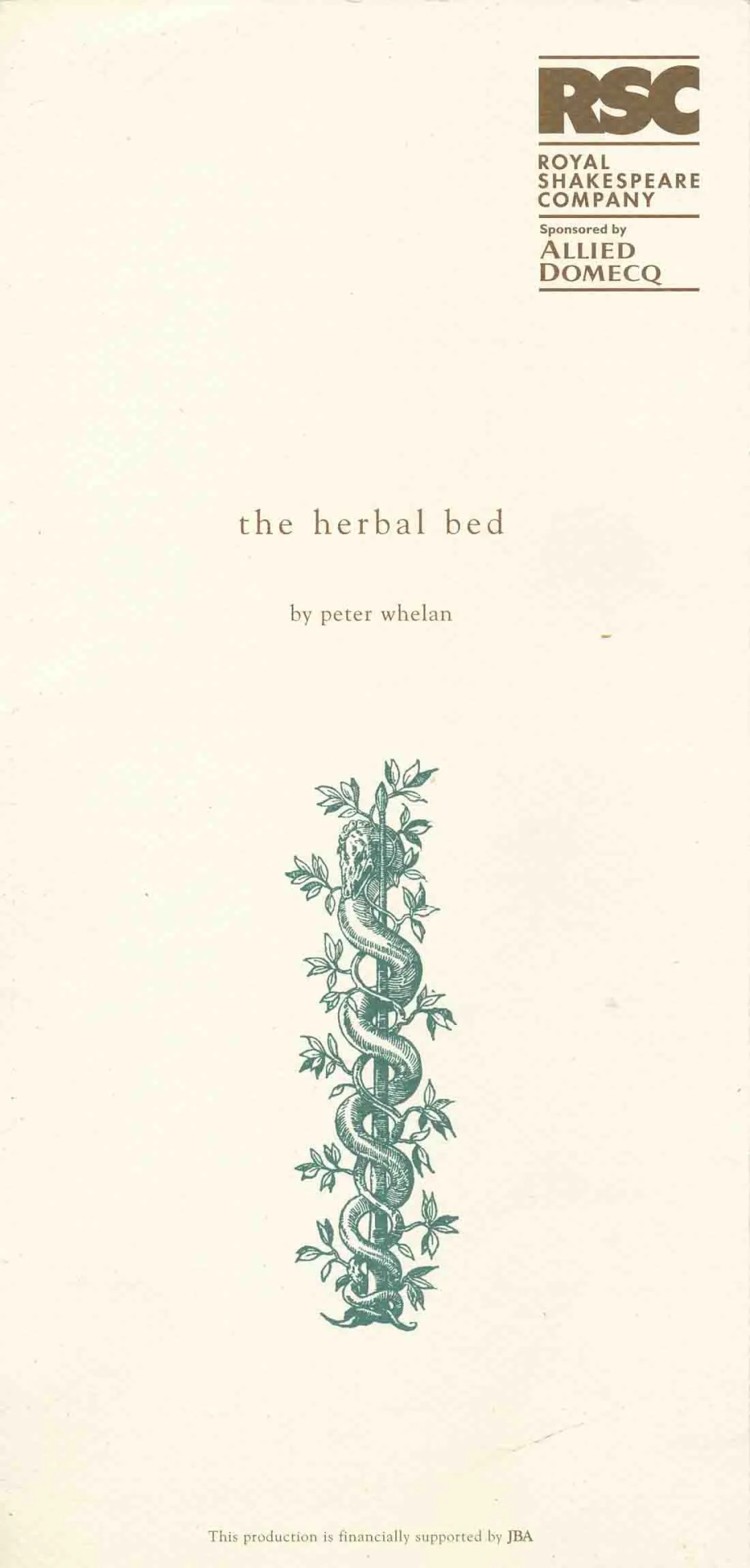
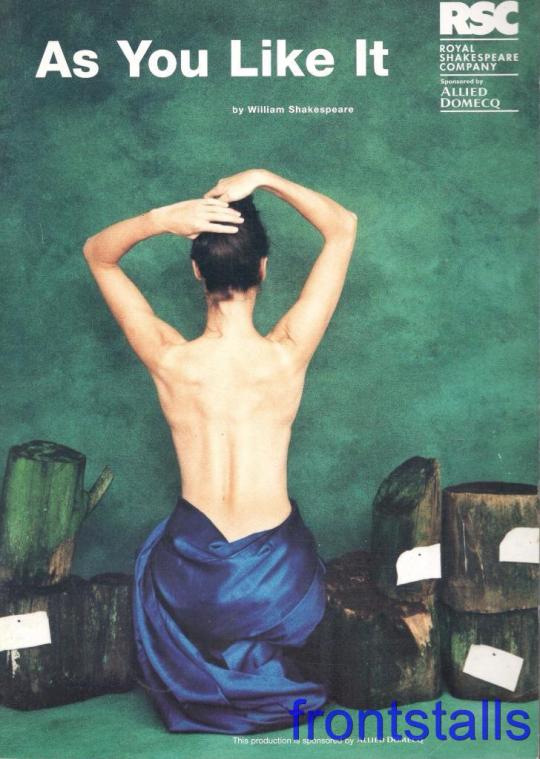

Programmes for The Herbal Bed, As You Like It, and The General From America
Next on David's theatre agenda was the role of Mickey in Hurlyburly (a play I've talked about before) which ran at the Queen's Theatre in London from August to November 1997. He then performed a one-off staged reading of Derek Jarman's Blue at the Chelsea Arts Theare on 16 November 1997 (which, by the way, is another little-known DT performance I want to explore!)
That was it for 1997, theatre-wise.
Then, beginning in March of 1998 - as I've explored previously - he began his run as Moon and Brindsley Miller in The Real Inspector Hound/Black Comedy. This double bill ran first at the Yvonne Arnaud Theatre in Surrey and then in London, first at the Richmond Theatre and then at the Comedy Theatre. That play finally wrapped in August 1998.
But a month before wrapping The Real Inspector Hound/Black Comedy, David had popped over to Stratford to do something interesting, something that's the focus of this thread. It was called For One Night Only, and - as it says on the tin - it was, indeed, for one night only!
First, though? A little history!
Around 1990, the RSC began to hold an annual summer festival called the Royal Shakespeare Company Fringe Festival. Intended as a showcase for RSC talent, it included a mix of events: short plays, devised pieces, stand-up comedy, concerts, etc., as well as new works making their Stratford debut. The festival lasted two weeks and saw actors, directors, stage managers, musicians and staff all taking part in more than 25 events. All the events were either on Sundays, or timed around RSC productions, so audiences could go see fringe shows after seeing the actors perform in their usual RSC roles.
Most of the events for 1998's festival took place in a specially adapted 100-seat rehearsal room at the RSC's 'alternative' theatre, The Other Place. But not all of them. Their opening night event - on Sunday, 19 July - was to take place at the Swan Theatre.
That opening night event? For One Night Only!
Starring Desmond Barrit, Emma Handy, and Amanda Harris as well as David, the launch event cost £4-£12 and began at 7:30 pm. It was called a "curtain raiser" as well as "aptly-named."
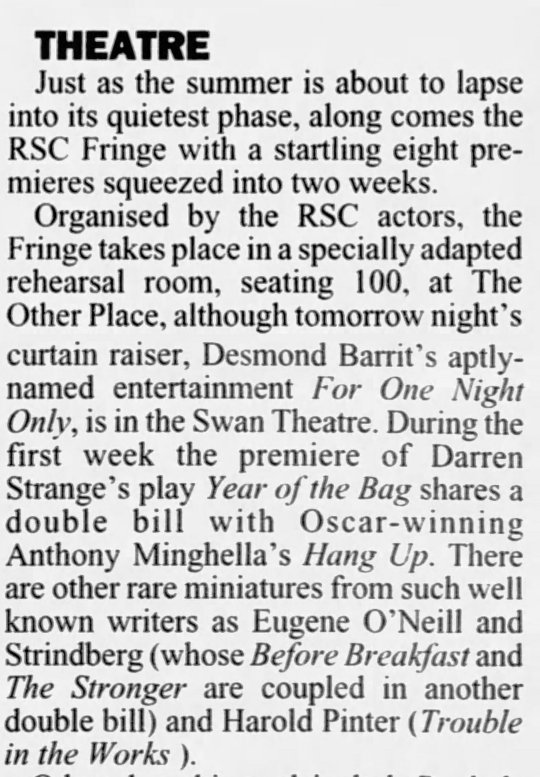
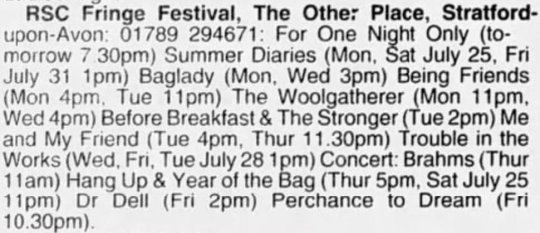
And just what was it about? Well, um....I know it was organized and compiled by its star, Desmond Barrit...and that it was supposed to take its audience on a journey through the theatre. These articles say so.
But that's about all I know. I wish I had more details.
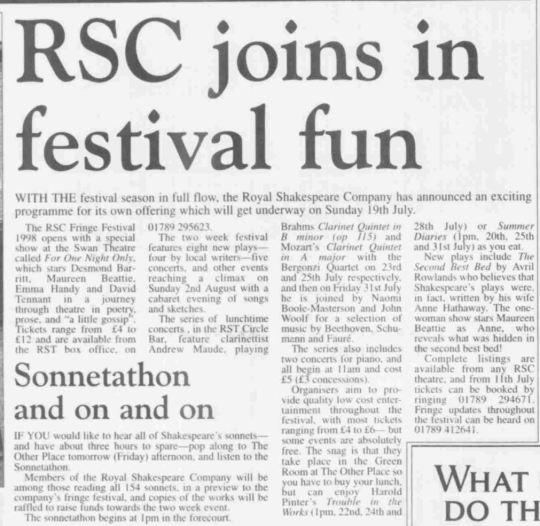
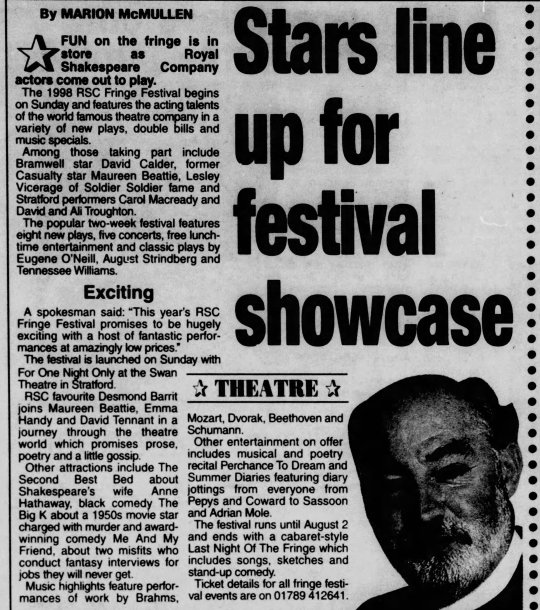
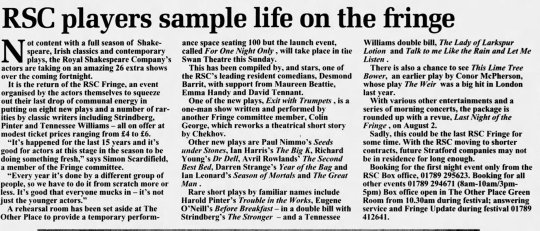
I am, however, supremely lucky to own a piece of ephemera about this one night only event.
Here's the front and back of my For One Night Only flyer, and as I'm sure you'll notice, it promises "an evening of theatrical prose and poetry...and a little gossip!"
Great. Could you tell us a bit more, thanks?
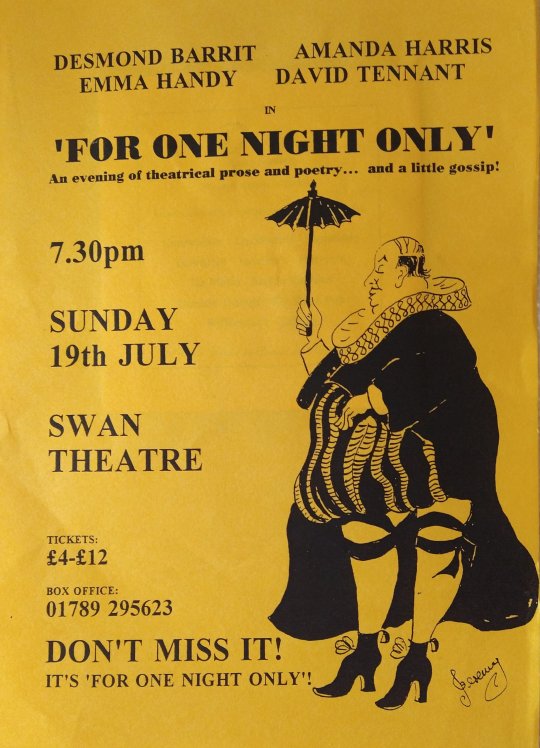
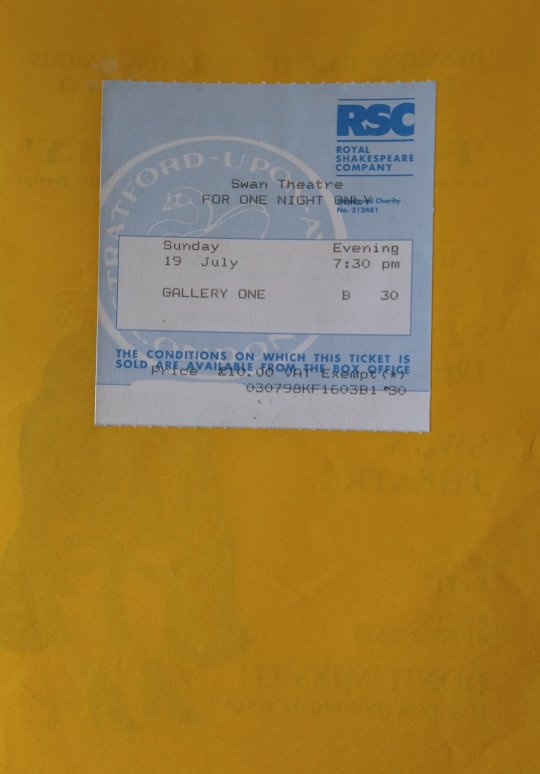
While researching For One Night Only, I came across something else of interest, which I thought for a moment David might have been involved in - an event staged nine days before For One Night Only. But after researching this event in more detail, I don't think he was involved, after all. Such a shame, really. He would've been perfect!
On Friday, 10 July 1998, at 1 pm in the afternoon, some Royal Shakespeare Company members got together to do a fund raiser and preview of the upcoming Fringe in the forecourt of the Other Place. Called a Sonnetathon, this three-hour event featured various RSC members reading all 154 of Shakespeare's sonnets!


Now a Sonnetathon would've been right up David's alley, am I right? He'd have loved it! But I'm about 99% certain he wasn't there - and here's why. That Friday night at 7:30 pm, David was onstage in The Real Inspector Hound/Black Comedy at the Comedy Theatre in London, that's why!
But here's why I say 99%. It's not impossible to imagine he got up early that Friday (after doing a show the night before) and took the train in to Stratford to do the Sonnetathon - wrapped it up by 4pm, then hopped on another train back to London in time to make the 7:30 curtain up for The Real Inspector Hound/Black Comedy.
But you have to admit, it seems unlikely.
But The Real Inspector Hound/Black Comedy wasn't showing on Sunday, 19 July 1998, so David was able to get to Stratford and go onstage as part of 'For One Night Only' to open the Fringe...and then get back to London in time to go onstage once more the following night.
So now you know what I know about For One Night Only.
Of course I'll keep looking for more!
30 notes
·
View notes
Text
Stardew Valley Sims 4 Generations Challenge
Original challenge by @chellplays, some revisions by @lybeuh
This is a twelve-generation challenge for all of the marriage candidates from concernedape’s Stardew Valley. This challenge is completely base game compatible with optional challenges for dlc. (Updated to at least High School Years EP)
Usual rules apply, meaning no cheats that give you an unfair advantage. Your sims do not have to look or be named after the characters in each generation. Do whatever you like!
Generation 1: Abigail
You were raised with humble upbringings. Your dad ran a general store, while your mom was best at complaining about your “alternative lifestyle.” You left home looking to start a life free of rules and parents, and with 20 000 simoleons in your pocket, you settled down in a new city.
Traits: music lover, loves outdoors, geek (alternatively, cats & dogs dlc: cat lover; snowy escape dlc: adventurous).
Aspiration: the curator.
Career: entertainer (musician branch) or tech guru (esport gamer branch).
Goals:
Have one “quirky” trait, appearance-wise (e.g., Unnatural hair color).
Obtain at least five points in the videogame skill.
max out the rock-climbing skill.
reach at least level 5 in any musical instrument.
Complete the frog collection.
Snowy Escape dlc: climb the top of the mountain in Mt. Komorebi
Have two best friends and marry one of them.
Befriend a ghost. Alternatively, with the vampires dlc, befriend a vampire.
Cats & dogs dlc: own a cat named David Jr., my first pet stuff dlc: have a rat, hamster, etc. named David.
Have at least two children.
Generation 2: Emily
You’re just working at the bar to make ends meet… but your real passion is tailoring. You make your clothes from scratch.
Traits: cheerful, music lover, good (alternatively, get together dlc: dance machine; city living dlc: vegetarian).
Aspiration: freelance botanist.
Career: culinary (mixologist branch) or barista.
Must live in the same house as your sibling.
Make a best friend with a sim who lives in another city/world.
Nifty Knitting dlc: max out the knitting skill.
Nifty Knitting dlc: complete the knitted clothes collection.
Grow your own garden. You like your meals organic.
Decorate your house with clothing racks. You love fashion.
Complete the elements or crystal collection.
Develop max affinity with another sim in both the green and pink bars, have two or more children with them, then “ask just to be friends.”
Never marry.
Generation 3: Sam
You are an outgoing, friendly sim who is brimming with youthful energy. You play guitar and drums and want to start a band as soon as you have enough songs together. However, you do have a habit of starting ambitious projects and not finishing them.
Traits: music lover, outgoing, ambitious.
Aspiration: musical genius.
Career: entertainer (musician branch).
Must not be the youngest child. Live with your younger sibling(s) until they are old enough to move out and have a good relationship with them.
Have a strained relationship with your father (if not applicable, with any one parent).
Have a job as a part-time retail employee as a teen.
Max out the guitar skill.
Obtain at least five points in the videogame skill.
Reach the job of the entertainer career.
Become best friends with two other entertainers.
Be married twice and have one child with each spouse.
Generation 4: Sebastian
You are a rebellious loner who lives in your parents’ basement. You tend to get deeply absorbed in computer games, comic books, and sci-fi novels, and will sometimes spend great lengths of time pursuing these hobbies alone in your room. You can be a bit unfriendly to people you don’t know.
Traits: loner, geek, bookworm (alternatively, high school years dlc: socially awkward).
Aspiration: computer whiz.
Career: tech guru (either branch) or freelance programmer.
Have a negative relationship with your half-sibling and stepparent.
Live in the basement of your parents’ house.
Reach at least level 5 of the videogaming skill.
Reach at least level 5 of the piano skill.
Reach at least level 5 of your career before marriage.
Reach the top of your career.
Only have one child, with whom you have a strained relationship.
Eventually let your relationship with your spouse deteriorate and subsequently get a divorce.
Generation 5: Penny
You live with your mom in a little trailer. While your mom is out carousing at the bar, you quietly tend to your chores in the dim, stuffy room you are forced to call home. You are shy and modest, without any grand ambitions for life other than settling in and starting a family. You like to cook (although your skills are questionable) and read books from the local library.
Traits: family-oriented, bookworm, neat.
Aspiration: big happy family (alternatively, parenthood dlc: super parent).
Career: none.
Live with your mother (if not applicable, any one parent), with whom you have a negative relationship.
Both you and your parent may not have jobs.
You must cook for your parent and clean the house every day.
Live in a trailer-esque house. You are by no means wealthy.
Reach at least level 5 of the cooking skill.
Marry the first person you fall in love with.
Your spouse is the only one who may bring in any income, while you are a stay-at-home parent. Earning money from writing, etc. is optional.
Own a luxury pool at some point in your life.
Generation 6: Harvey
You’re a little old for a bachelor, but you have a kind heart and a respected position in the community. You live in a small apartment but spend most of your time working. There’s a sense of sadness about you.
Traits: genius, foodie, good (alternative, get together dlc: dance machine).
Aspiration: successful lineage.
Career: astronaut (space ranger track) or get to work dlc: doctor.
Never date throughout your teens or young adulthood. Focus on your career instead. Get married only as an adult.
Reach the top level of your career.
Own a coffee machine. Drink coffee as much as possible.
Go jogging at least three times a week.
Set up a reading garden in your backyard.
City living dlc: live in an apartment.
Seasons dlc: be a scout.
Have at least two children. Having spent most of your life single, you want to have a comfortably sized family asap.
Generation 7: Haley
Being wealthy and popular throughout high school has made you a little conceited and self-centered. You tend to judge people for superficial reasons. But is it too late for you to discover a deeper meaning to life? Is there a fun, open-minded young person hidden within that shell?
Traits: materialistic, snob, outgoing (alternatively, high school years dlc: self-absorbed).
Aspiration: fabulously wealthy (alternatively, city living dlc: city native).
Career: none until after you’re married.
Become enemies with your sibling(s) as a teenager.
Max out the photography skill.
You may only get a career after you are married, and you must follow the same career path as your spouse. They opened your mind and inspired you to have interests beyond shopping.
Earn at least three points in charisma, so you may donate to online charities after you are married.
Bake a cake for every birthday that comes around.
Grow a flower garden.
Become friends with your sibling(s) again after you are married.
High School Years dlc: be a cheerleader as a teen.
Generation 8: Elliot
You live alone in a cabin. You are a writer who dreams of one day writing a magnificent novel. You are a sentimental “romantic” with a tendency to go off onto flowery, poetic tangents. When you can afford it, you enjoy a strong beverage at the bar.
Traits: romantic, bookworm, loner.
Aspiration: bestselling author.
Career: writer (author branch).
Live in a cabin-esque house.
Reach the top level of your career.
Max the writing skill.
Reach at least level 5 in the piano skill.
Reach at least level 5 of the cooking skill.
Own a small garden.
Specialize in romance books and poetry. Later, you may also specialize in sci fi or mystery novels.
Write love emails to your love interest at least once a week.
Go to a bar at least once a week.
Generation 9: Leah
You love to spend time outside, foraging for a wild meal or simply enjoying the gifts of the season. You’re a talented artist with a large portfolio of work… yet you’re too nervous to display it to the public.
Traits: art lover, loves outdoors, foodie.
Aspiration: painter extraordinaire.
Career: none (painter later on).
Reach maximum painting skill, and paint at least 5 masterpieces.
Date only one person in your young adulthood and have a child with them, but never marry. Your partner is unsupportive of your artistic lifestyle and encourages you to “get a real job.” Whether you choose to get a traditional career, that is not as a painter, is up to you.
Eventually marry the love of your life as an adult: someone who is supportive of your art. If you did choose a career, quit, and take up a career as a painter.
Have at least one child with your new spouse.
Harvest wild fruits, vegetables, etc. On weekends.
Grow an excellent apple tree.
City living dlc: attend a flea market and sell your art.
Generation 10: Maru
You acquired a passion for creating gadgets at a young age. When you aren’t in your room, fiddling with tools and machinery, you sometime do odd jobs at the local hospital.
Traits: ambitious, outgoing, geek.
Aspiration: nerd brain.
Career: astronaut (space ranger branch), or get to work dlc: doctor or scientist, or discover university dlc: engineer (either branch).
Have a negative relationship with your half-sibling.
Reach the top level of your career.
Max out the handiness skill.
Max out the logic skill.
Upgrade at least five objects.
Own a rocket ship.
Your sim’s partner must be friends with your father (if not applicable, with either parent) before you can become engaged.
Eventually, your relationship with your spouse becomes strained and you break up. You die as soon as your eldest child is a young adult.
Get to work dlc: get abducted by aliens.
Generation 11: Alex
You love sports. You are quite arrogant and brag to everyone that you are going to be a professional athlete. Is your cockiness just a facade to mask your crushing self-doubt? Are you using your sports dream to fill the void left by the disappearance of your parents?
Traits: bro, active, mean, self-assured, (alternatively, cats & dogs dlc: dog lover), (alternatively, high school years dlc: self-absorbed.
Aspiration: bodybuilder.
Career: athlete (professional athlete branch).
Goals:
Become enemies with your father but have had a very close relationship with your mother.
Begin dating in your teens and go on at least three dates with three different people.
High School Years dlc: join the football team as a teen.
Max out the athletic skill.
Reach the top level of your career.
Do not marry until you are in the later stages of young adulthood. You’re marrying your soulmate, someone who stuck with you despite your arrogance.
Have at least two children with your spouse.
Cats & dogs dlc: own a dog named dusty.
Generation 12: Shane
You are often rude, unhappy, and suffer from depression and alcohol dependence. However, your attitude starts to change towards your spouse. After work you frequently spend your evenings at the bar. If you could reset your life maybe you’d start a chicken farm. Only free-range eggs of course.
Traits: lazy, gloomy, mean.
Aspiration: master mixologist, (alternatively, cats & dogs dlc: friend of the animals).
Career: retail worker until after marriage.
Live with your aunt or uncle until you’re married, have a good relationship with said aunt or uncle.
Have a career as a retail worker as a teen.
Go to the bar after work every day.
Get pizza delivered at least once a week.
Only get married as an adult.
After marriage, quit your job and choose a different career path. You’ve been encouraged by your spouse to give up alcohol.
After marriage, start a garden.
Have a maximum of two children.
Cats & dogs dlc: adopt a cat and a dog, train the dog in all possible tricks.
Cats & dogs dlc: max out the pet training skill.
Cottage Living dlc: buy a chicken coop, raise chickens, and name one of them Charlie.
27 notes
·
View notes
Text
Looking for mutuals!
Hey, my name is Cursed, and here's some things about me.
Aromantic Asexual
Nonbinary (Experimenting with the idea)
Musician
Programmer
Gamer
Nerd
Writer
Sarcasm Lover
Furry Enthusiast
Here are some anime/studio-ghibli I like too!
Demon Slayer
Your Lie In April
Hell's Paradise
Silent Voice
Your Name
Assassination Classroom
Games I play!
Overwatch 2
R6S
Minecraft
Dead by Daylight
Story games in general
I speak...
English (born and living in the U.S)
German (in school)
Russian (self-taugh for a couple weeks)
I'll probably post mostly about my life, but it'll include a lot of this stuff!
All of my personal posts from now on will be under #curse2275
Like, repost, etc. please!
If you think we'd be good friends, let's be mutuals!
#gender nonconforming#agender#trans#genderfluid#enby#nonbinary#genderqueer#aroace spectrum#aroace pride#acearo#furry#furry community#gaming#gamers of tumblr#aroace#ace pride#aro pride#pinned post
5 notes
·
View notes
Text
guide. info. whatever.
hi. you must be somewhat interested in me and my art if you found this page so i'll give you a quick guide to what's on here and some stuff about me.
--
bio:
my name is bronwyn. not my birth name, but more like a pen name for everything i do online. im a musician from nj and im in university for a degree in audio engineering and music. i spend most of my time making music, but on the side i also like to write short stories, poetry, etc. in a past life i used to be a game dev/programmer. in a past past life i was a film kid. even further back i used to draw.
i was born in '03 and im pinoy/puerto rican. i use any pronouns.
if you want to know more about me, im an open book. just shoot an ask at me if you wanna know something.
--
blog:
this blog is meant to be an archive of all my creative endeavors. you'll mainly find music demos and short story drafts here, but if i find anything else to share it'll be here.
a lot of the writing here is from a while ago so if it isn't very good, that's probably why. my goal with this blog isn't to have my work widely shown, this is mainly for anybody who is curious about what else i do outside of music. i'm not the greatest writer, poet, etc.
if you want to keep up with my antics and get updates on my music and such, i'd suggest following my instagram instead (@bronwynisntreal/IG).
--
hope you enjoy your stay. here's a pic of my cat to accompany you:
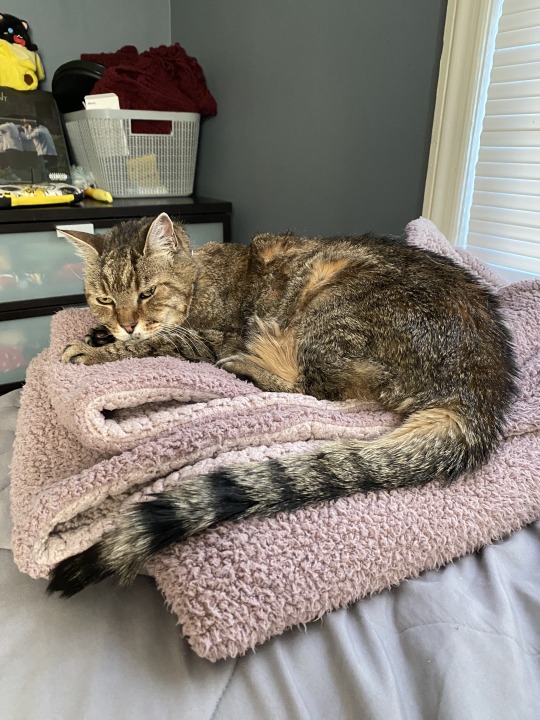
2 notes
·
View notes
Text
Anonymous asked: It’s so good to have you back posting. You mentioned seeing Wagner’s Ring Cycle at the Bayreuth Festival no less during your five month hiatus from your blog. How was that? I’m one of the lucky few to make a full time living as a musician in a symphony orchestra. I’m a Wagner fan as you are too and so I hope you could settle a question about Wagner. I’m sure you know how picky he was about the demands he made on his audiences. If Gustav Mahler contributed to the origination of the modern concert hall experience then did Richard Wagner really make the noisy audience shut up and be silent during opera performances on stage?
It’s easy to look at any stern looking portrait of Richard Wagner with his mutton chop whiskers and not think yes, this Teutonic cad is a killjoy (even if you can get past the lurid anti-semitism etc). But I fear for some things we do Wagner an injustice. Many bad things usually attributed to him are in reality unfair and even untrue. Things are so easily believed because it reinforces the nasty bad boy image we have of him.

This past summer I did see Wagner’s Ring Cycle in Bayreuth, the shrine of all things Wagnerian. My French partner grumbled we were better off spending and extra week of vacation in Bali rather than waste a week on Wagner. As a strong Wagnerian, this was all sacrilege to my ears of course. But in hindsight I should have known better. Any opera staged at Bayreuth these days should be approached with fear and trembling. In short, I was better off listening to Wagner on my headphones whilst sipping cocktails on a beach in Bali than live through the dross on display at the Bayreuth festival.
Growing up everyone told me, the best place to see Wagner’s Ring is Bayreuth, in the magnificent Festspielhaus that the composer built for that very purpose and opened in 1876. That’s what they used to say in Wagner’s day but not today. These days if you want a traditional production, as paradoxical as that sounds, you stay away.

Bayreuth has for some time now specialised in clever, sometimes too-clever-by-half, productions that place the master’s operas in a new context. But at least they try for coherence, unlike some other venues which have assigned each of the four operas to a different director. But at least they try for coherence, unlike some other venues which have assigned each of the four operas to a different director. Earlier this year Stuttgart went even further by entrusting each of the three acts of Walküre to three different production teams. Madness - and this new production has plenty of it, whether a good or bad thing depends on your attitude. Minor cheers mixed with extensive booing greeted the first opera Rheingold, and a thunderous boo followed the second, Walküre, immediately the curtain closed. Bayreuth is famous for such disapproval. I admit I was ticked off, annoyed, and then finally seething by the end. I wish I had a flame thrower so I could burn the whole stage down.
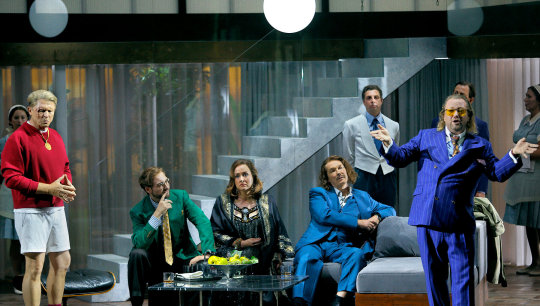
This Ring Cycle was being staged byValentin Schwarz, a 30 something Austrian opera director, and under the musical direction of Cornelius Meister. Schwarz was handpicked by Katharina Wagner. She’s the controversial director running the Bayreuth Festival - not because of talent (she has none) but by virtue of being Richard Wagner’s great-granddaughter (as well as Lizst’s great great granddaughter). In fact Schwarz’s production of the Ring Cycle was actually delayed from 2020 because of the Covid lockdown - so he had all these two years or so to fine tune it and get it right. He did neither and it was a like someone taping your eyelids back and strapping you down before forcing you for nights on end to watch a mind numbing TV soap opera on huge plasma screen.
I knew I was in trouble from the moment I opened the programme notes. My heart sank. Schwarz wasn’t looking to make a coherent Ring Cycle with Wagner’s libretto in a traditional sense, and is instead intended to be “constructively disrespectful”. Such a concept, which includes a deliberately “liberal approach to the plot”, and shifting representations of objects and ideas over the four evenings, is justified by alleged inherent inconsistencies within the work itself.
Oh. Dear God. No.
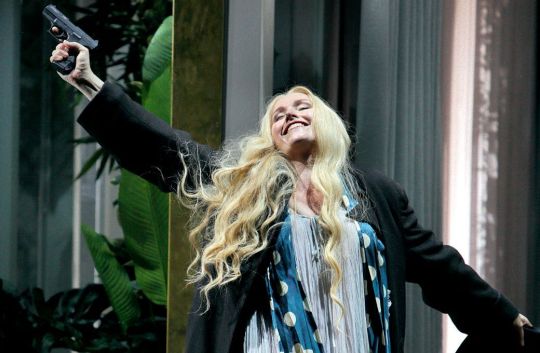
So this chap’s artistic approach was to go for ‘coherent incoherence’ to his overarching message. No, it doesn’t make sense to me either.
I know Wagner traditionalists, and I include myself, are always a hair trigger away from getting our knickers in a twist but when you’re putting on the complete Ring Cycle over four days then we can expect the bare minimum. So there has to be Ring because it’s called the Ring Cycle and preferably gold. And maybe throw in moving funeral march of Siegfried and a heart breaking farewell of Wotan to his daughter Brunnhilde. The bar is quite low. But no, we had none of this. Not even spears or swords and certainly no dragons (as Wagner had intended).
Wagner’s original conception embraces a three-fold division of the world: the Nibelungs beneath the world, the giants on the surface, and the gods in the cloudy heights; all this is made explicit in the third opera Siegfried. But what do we the audience get: a cheap and nasty prime time TV soap opera with studio sets to match. The paddling pool of Rheingold, where the Rhine maidens appear as nannies with children, had become a deep but empty swimming pool. There Hagen kills Siegfried, while his vassals lie half asleep in the fenced-off area above. Brünnhilde, who is supposed to be the tragic but awesome agent of destruction and rebirth, settled herself on the bottom of an empty and dirty swimming pool next to the dead body of her husband Siegfried with the remains of her mutilated horse in a plastic bag.
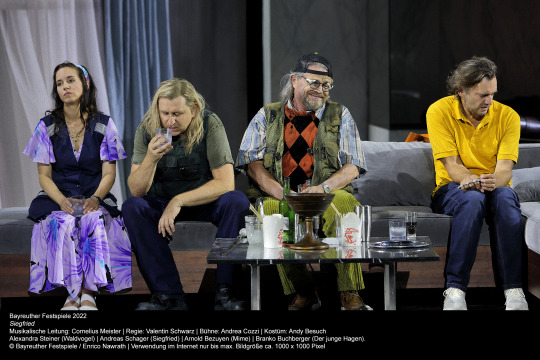
I tried to look past this travesty and honestly digged deep to make sense of what the production was trying to say. The whole staging and the costumes had a TV family soap opera flavour, that was blindingly obvious. But to what end? If there was an overarching theme then perhaps it was to focus on families and how wealth transforms and poisons future generations such as child abuse. The opening E flat chords of Das Rheingold played to a projection of twin foetuses in the womb. At first, they were intertwined peacefully, before one attacked the other, ripping the umbilical cord from its stomach. Moreover, through his programme notes, if not via actions on stage, Schwarz tells us that these warring foetuses are actually brothers of his own creation – Wotan and Alberich. What this sets up is an attempt to place the majority of the work’s characters into one of two branches of the same family – broadly, the have and have-nots – in order to compare their contrasting, or sometimes similar, fortunes, throughout the four evenings.
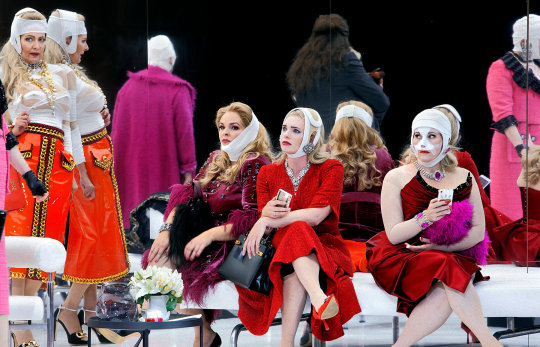
If that was the theme then I not convinced that it worked. Wotan at the start appears as a wheeler-dealer with a mobile phone, willing to be utterly ruthless, as when he shoots his own extra-marital son Siegmund in the second opera. This is Wagner’s Ring as dynastic soap opera but who cares? It’s not going anywhere. Schwarz’s idea, in Rheingold, that the cycle’s foundational sin was the seizure of a child, not of the gold from which a ring of power would be created, was not convincing. In Die Walküre, successfully subverting another big moment to the horror of traditionalists, he placed the final focus of the opera on Fricka’s futile triumph over Wotan, not on Wotan’s farewell to his daughter Brünnhilde. cycle ran out of steam in the end because it had no big or unifying idea.
New Ring cycles are springing up as the world’s opera houses get back into their rhythms after the pandemic. It is a competitive market. Among others, there was a well received one in Leipzig in June of this year, a promising one in Zürich, there’s another in Berlin this autumn and two in London in the years to come. Bayreuth remains an extraordinary venue, its ambitious ability to mount a new cycle in a single season is remarkable, and the 150th anniversary Ring, to be mounted there in 2026, will doubtless be a global event. But the festival feels as though it needs a radical rethink if it is to merit the reputation and attention.
My feeling, after mingling and chatting to others present to witness this travesty, is that many of the audience who were there this year may not have the patience to return for the revival of a Ring that went nowhere.
Increasingly I will tell anyone who wants to experience Wagner is to stay away from Bayreuth. Go and see a production anywhere else but Bayreuth that actually honours the spirit of Wagner’s artistic vision and above all respects the operatic lore and the source material.
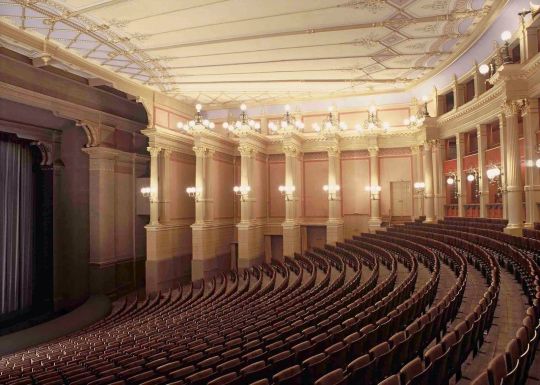
So let’s move on to more pleasant matters. Your question of Wagner and silence in operatic performances.
In effect you're asking about audiences at performances rather than the performers which I think is an interesting question!
Wagner the composer, not the man, was responsible for many things which I think he doesn’t get enough credit for. In effect he revolutionised the operatic stage. Of course one one of his reforms was to dispense with the term "opera," which he replaced with Music Drama. It was at his iconic Festival Playhouse in Bayreuth that he pioneered innovations which we all now take for granted as traditions. It was Wagner who first hid the orchestra in a sunken pit. It was Wagner who insisted on darkening the theatre. And it Wagner who did away with boxes (except for King Ludwig) and instead built in amphitheatrical seating with no aisles. All these innovations were designed as a way to focus all the attention to the stage. The atmosphere of ‘consecration’ striven for at Bayreuth - Parsifal, Wagner's last stage work, was called something like a "Stage-Consecrating Festival Play" (Bühnenweihfestspiel) - meant that talking, moving, etc. were strongly discouraged. Since all the seats were in long rows that spanned the entire auditorium with no aisles, it was basically impossible to leave your seat during an act without making a scandal.
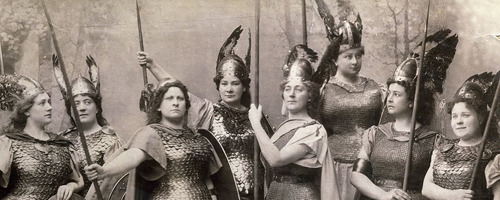
But did Wagner innovate the idea of silence of the audience before an operatic performance? Back in the day, Mark twain found himself writing a letter back home from Beyrouth where he had seen Tannhauser and suggesting the audience was quiet. He wrote, “I saw the last act of "Tannhäuser." I sat in the gloom and the deep stillness, waiting--one minute, two minutes, I do not know exactly how long - then the soft music of the hidden orchestra began to breathe its rich, long sighs out from under the distant stage, and by and by the drop-curtain parted in the middle and was drawn softly aside, disclosing the twilighted wood and a wayside shrine, with a white-robed girl praying and a man standing near. Presently that noble chorus of men's voices was heard approaching, and from that moment until the closing of the curtain it was music, just music--music to make one drunk with pleasure, music to make one take scrip and staff and beg his way round the globe to hear it.”
An audience at Bayreuth hasn’t always been known to be silent especially when they witness what they see as sacrilege on stage and they vent to make their feelings known with boos and cat calls. The story is similar in Milan at the equally famed La Scala too. In Italy to boo and catcall at the opera is positively a national past time. At La Scala opera singers were (and still are) at the mercy of a small group of Milanese musical purists - known as loggionisti, because of their fondness for the cheap seats (loggione) - if their performance was not up to scratch. It’s perfectly normal to interrupt the performance several times with noisy catcalls, and then round off the evening by booing loudly during the curtain call. How charming.
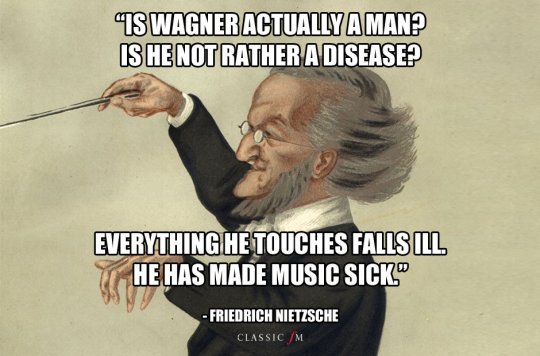
But did Wagner definitely usher in the silent audience for an operatic performance? It’s hard to say. We need to step back a little.
When the first public opera houses were founded in the mid-17th century, they were designed more as venues for social interaction than as sites of pure and sacrosanct aesthetic experience. Fanning out from the stage in glittering tiers were the boxes. Owned or leased by aristocrats or wealthy bourgeois, these intimate little spaces were perfect for entertaining guests, exchanging gossip or simply being seen. Down below was the parterre. Usually left open and generally without seating, this was the preserve of lower-income groups, including soldiers, students and servants, who used the space to meet friends, share a drink and gamble. Accordingly, the music was treated with noisy indifference, at best, or vocal contempt, at worst. Audiences were more interested in their own conversations than with what was happening on stage. They might perhaps listen to an aria, or watch the ballet (if there was one), but no more; and, if they did not like what they heard, they would make their displeasure known.
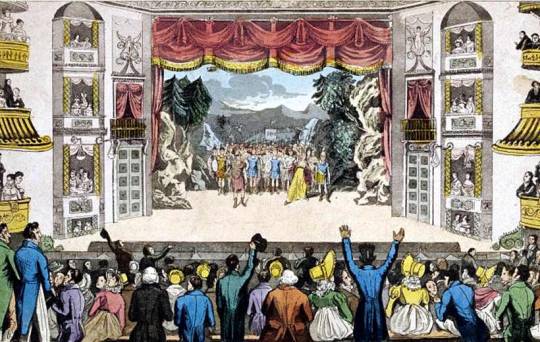
By the 18th century – when many theatres installed seats in the parterre and converted the top tiers of boxes into open loggione - the unruliness of performances had already become a commonplace of literature. In Les Liaisons dangereuses (1782), for example, Pierre Choderlos de Laclos indicated that well-bred patrons thought it quite acceptable to chat throughout a performance. In a letter to Sophie Carnay, Laclos’ ‘heroine’ Cécile de Volanges relates that she had been invited to the Marquise de Merteuil’s box at the Paris Opéra so that they could talk about her forthcoming marriage ‘without any fear of being overheard’. Naturally, such sociability all but smothered the music. After a visit to La Scala in 1770, the English music historian, Charles Burney, complained that the ‘abominable noise and inattention’ of his fellow patrons had made it impossible to make out anything but a few bars during some of the better known arias.

We can assume that British opera-goers were more reverent than their Italian counterparts. Samuel Sharp, a Brit visiting Naples in 1765, wrote in horror that at the San Carlo opera house “the crowd laughed and talked through the whole performance, without any restraint; and, it may be imagined, that an assembly of so many hundreds conversing together so loudly, must entirely cover the voices of the singers.” 85 years later, Mary Shelley expressed similar frustrations in Milan: “Unfortunately, as is well known, the theatre of La Scala serves, not only as the universal drawing-room for all the society of Milan, but every sort of trading transaction, from horse-dealing to stock-jobbing, is carried on in the pit; so that brief and far between are the snatches of melody one can catch.” In fact, for a while, La Scala was the only place the Milanese were allowed to gamble.
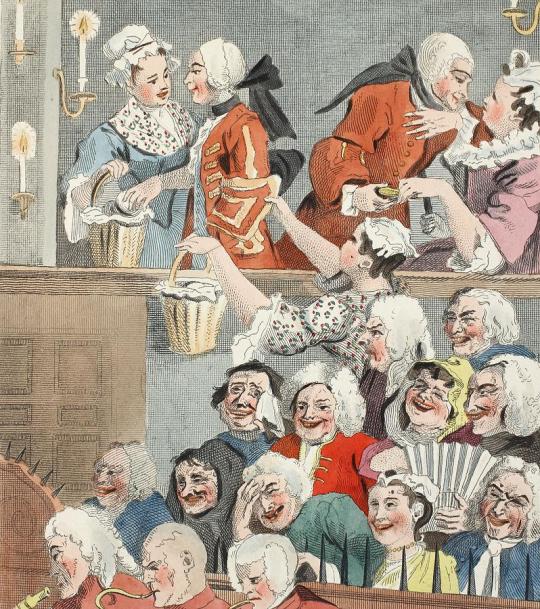
But this was entirely understandable. Imagine you’re an upper-class citizen in 18th or 19th-century Italy. You go to the opera regardless of what is playing, simply because that is where you will encounter the rest of society. You might attend in hopes of catching the eye of an attractive young lady or gentleman. Or maybe you want to talk politics - you can do that during the performance, too. Disappointed in a singer? Mention it to everyone else in your box. Hungry or thirsty? Flag down a seller of drinks or oranges. Buy and eat them - no need to wait for an intermission. Mid-eighteenth-century composers intentionally gave a less important singer the first aria in act two. This was known as the “sorbet aria”: it was traditional to serve sorbet at that time, and the clinking of the spoons made the music difficult to hear.) If the opera truly bores you, you can always pay a visit to friends in another box or head to the gambling tables.
Angered by the lack of respect for their music, some composers attempted to fight back – even writing works satirising their audiences’ bad manners. The anonymous Critique des Hamburgischen Schauplatzes (1725), for example, offered a comical defence of opera against the frequent interruptions of German loggionisti. But it was a losing battle. Realising that no audience would listen to an entire work, composers started to produce pieces that took account of their inattention. These often included an aria di sorbetto (‘sherbet aria’), an incidental passage that allowed the audience to buy food or drink without fear of missing anything important.

Such concessions only encouraged further raucousness. By the early 19th century, it was almost out of control. In Paris, the situation was particularly bad. In the 1830s, Honoré de Balzac admitted that no one went to the Opéra for the music; while in Stendhal’s Le rouge et le noir (1830) Julien Sorel quickly learns to disregard the performance in favour of his own intrigues. But in Milan, it was even worse. In 1840, Mary Shelley wrote: ‘The theatre of La Scala serves not only as the universal drawing-room for all the society of Milan, but every sort of trading transaction, from horse-dealing to stock-jobbing, is carried on in the pit; so that brief and far between are the snatches of melody that one can hear.’
This kind of control the audience had even influenced what performance happened onstage as well. We still see the occasional encore of a famous aria by a star singer, but in past centuries the audience could and did demand multiple encores of many pieces (little wonder, given how difficult it must have been to hear them the first time around!). In Vienna in 1786, Le nozze di Figaro was received five encores its first night and seven its second (prompting an emperor-imposed ban on encores at future performances, to keep the opera to a reasonable length). Verdi’s Otello had a particularly successful premiere in Milan, with even interludes encored and 20 curtain calls!

Not until the late 19th century did the composers and music directors gain the upper hand and in turn imposed silence as the norm for watching audiences. Even then, it took longer to reach some countries than others. An amusing illustration of the difference between Britain and Italy can be found in E.M. Forster’s novel Where Angels Fear to Tread (1905). Hoping to talk their widowed sister-in-law out of marrying an Italian, the interfering siblings, Philip and Harriet Kingcroft, rush off to the Tuscan town of Monteriano. Soon after arriving, Philip spots a poster announcing a performance of Donizetti’s Lucia di Lammermoor and tries to persuade the sceptical Harriet to go with him. ‘However bad the performance is to-night’, he warns, ‘it will be alive. Italians don’t love music silently, like the beastly Germans. The audience takes its share – sometimes more.’ And so it turns out. Though Harriet does not care for music, Forster noted, she knows ‘how to listen to it’, and is outraged by the constant shouting and whistling. Not until the mid-20th century would poor Harriet have been able to find an Italian theatre where silence more or less reigned.
Why did audiences change their minds? Part of the reason is undoubtedly the evolution of opera itself. Although composers had previously been willing to accommodate unruly behaviour, the advent of Romanticism persuaded Germans to adopt a more uncompromising approach in their music. Beginning with Louis Spohr – who abhorred the ‘vile noise’ of Italian opera houses – attempts were made to make opera more like the Singspiele (‘sing-plays’) of folk tradition. This entailed grouping arias into longer and more coherent scenes, which could not be interrupted or missed without the narrative thread being lost. The culmination of this trend was Richard Wagner’s notion of the Gesamtkunstwerk (‘total work of art’).
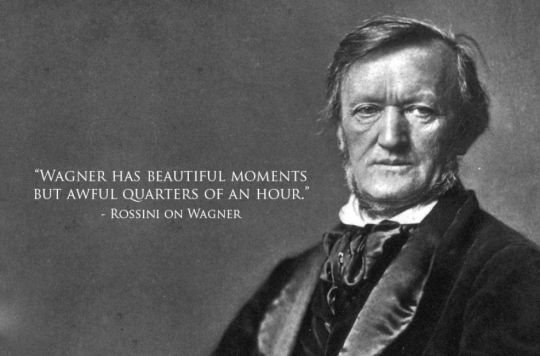
And now we come to Richard Wagner.
Most people blame Wagner for turning on the sound of silence. Because he was in total control at Bayreuth, he went ahead and eliminated audience boxes, hid the orchestral pit, and plunged the audience into darkness. The message was clear: look at the stage, not each other. Pay attention to the music and the action. Let the artists control your experience.
Wagner though didn’t just control his environment that his art demanded (or enforced) but he made demands on the audience for his music in the name of art. Combining music, poetry and drama in epic form, Wagner greatly expanded the role of the orchestra and relied more on the use of leitmotifs - recurrent musical themes associated with a particular character or idea - much beloved of movie soundtracks today, just listen to any John Williams composed films or Howard Shore’s Lord of the Rings - than on structural divisions to advance the story. So great were the demands placed on audiences, that little scope remained for inattention – or interjection. And, as Wagner’s influence spread, so did the silence.
Of course that silence by the audience during performances was also due to social changes and who went to the opera and it’s important to note that. Between about 1650 and 1850, opera was ‘enjoyed’ by a relatively broad range of people. Though public opera houses tended to be financed by monarchs, nobles or wealthy merchants, performances were attended by high and low alike. In the later 19th century, however, the emergence of music halls changed everything. Offering every kind of entertainment - from music to magic - and a deliberately relaxed atmosphere, these quickly won the favour of the working classes and those who didn’t have spare cash to burn. And so opera houses became the preserve of the upper and middle classes.
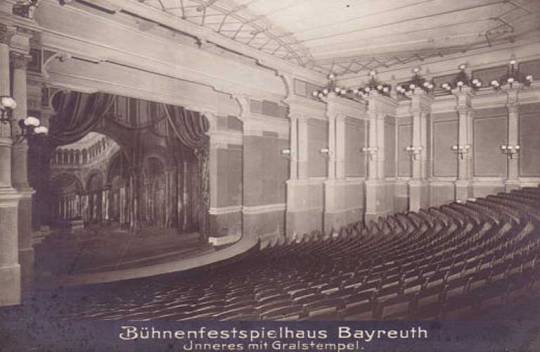
And what happens when the bourgeois and the middle classes capture an art form as an exclusive preserve of their class entitlement? They become snobby about it. They had to socially distance themselves from the great hoi polloi and the crude ways of the working poor. And what better way to virtue signal your civilised class refinement that than to socially enforce a reverential code of sacrilegious silence when watching an opera performance on stage?
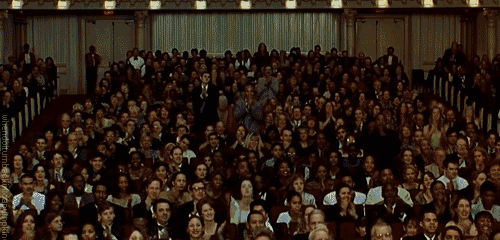
Indeed it’s ironic that Wagner himself who did much to usher in the silence was a victim himself. At Bayreuth performances audiences do not applaud at the end of the first act. This tradition is the result of a misunderstanding arising from Wagner's desire at the premiere to maintain the serious mood of the opera. After much applause following the first and second acts, Wagner spoke to the audience and said that the cast would take no curtain calls until the end of the performance. This confused the audience, who remained silent at the end of the opera until Wagner addressed them again, saying that he did not mean that they could not applaud.
After the performance Wagner complained, "Now I don't know. Did the audience like it or not?"At subsequent performances some believed that Wagner had wanted no applause until the very end, and there was silence after the first two acts. Eventually it became a Bayreuth tradition that no applause would be heard after the first act, but this was certainly not Wagner's idea. In fact, during the first Bayreuth performances, Wagner himself cried "Bravo!" as the Flower maidens made their exit in the second act. But on this occasion when he did this he was severely hissed by some of the audience watching. Wagner was scolded in his own theatre for being a rabble rousing lout. Charming.

All this is to say that this has rather uncomfortable implications. In preferring to listen to an opera in silence, are we really just perpetuating a form of Victorian snobbery? I will leave that for you to think further on.
I confess that I grew up in the Wagnerian tradition, like most opera fans, of respecting an operatic performance as it was happening with silence (even if I wanted to scream abuse at someone on stage as if I was at a football match). I’m no different from anyone else if some idiot is coughing loudly and I give him a look of silent despair or if some poor dear starts chatting to her neighbour then I just get mildly annoyed. I’m there for the opera to lift me out of my body and immerse me into the full drama and music. But even I can understand that such an imposed passivity might make opera inaccessible to everyone (or at least the ones it used to appeal to in the early days). Operas are long - especially Wagner’s operas - and it’s a rare person who can sit through an entire performance hanging on every note with almost religious devotion.

Perhaps the time is long overdue when we need to be so precious with such conventions, if only to broaden the appeal of opera. I’ve been fortunate to have seen operas all across Europe and few exceptional venues overseas too such as the Met in New York. These days if I go to the opera it’s to the Palais Garnier here in Paris. Surprisingly it’s not a stuffy affair as people come dressed as they please and the prices are more affordable, more so than in London. Change in the opera house culture comes at a glacial pace of turning a tanker around, but I feel they are heading in the right direction with their outreach work to appeal to a broader audience.
I’m all for innovation in that regard. Pop up performances in cafés or art galleries or other cool public venues may help people take a second look at opera again…and wrest control away from the stifling hold of the bourgeois. It’s not pure opera but hopefully it helps young people especially to embark on a journey to the opera house.
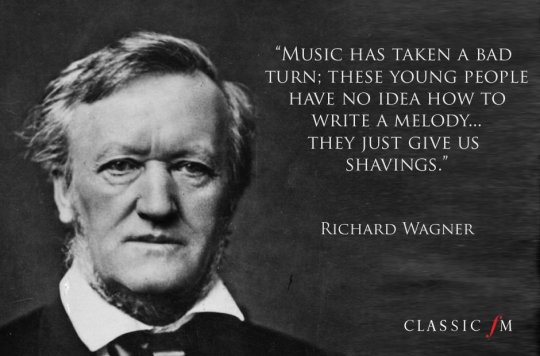
I hope we can have it both ways. I want to hear the music, and I also want the opera house to be a gathering place for all of society and a true diversity of people. I can’t imagine how one does that. Perhaps longer intermissions for food and drink? A beer tent with premium German beer? Or maybe a quiet gambling den area in the lobby area? And perhaps a brothel sponsored bonking boxes for…well, I’ll let your imagination run riot. And it would be keeping with tradition too.
The foyer de la danse in an opera house was a backstage room that essentially served as a brothel for opera and ballet patrons and aficionados in the 19th Century. While other international ballets and operas at the time had similar practices, the 19th century Paris Opera Ballet at the Palais Garnier was perhaps the most notorious and most celebrated by Parisians - how else do you suppose Edgar Degas hang out drawing sketches of nubile ballerinas. The opera house managers were positively pimping out the ballerinas and other artistic performers to keep the wealthy patrons sweet. Not that I’m condoning the legitimacy of courtesans flogging their wares during a performance of La Traviata, although Giuseppe Verdi might smile at the irony given that his celebrated opera was essentially about a Parisienne courtesan, Violetta Valery.
I’m sure the surly and serious minded Richard Wagner would get his mutton chop whiskers in a twist.

Thanks for your question.
#ask#question#music#opera#richard wagner#composer#wagner#ring cycle#bayreuth festival#bayreuth#german#germany#singing#music drama#paris#palais garnier#audience#history#music history#performance#mahler#verdi#concert#arts#culture#personal
33 notes
·
View notes
Note
Hot take: this blogger-streamer-programmer-artist-musician-(etc.-)person deserves The World, actually, and should be famous and recognized for their wits and witticisms, and also should be allowed to just play some darn video games despite apparently not being allowed to by some cosmic rule.
.
2 notes
·
View notes
Note
are you still thinking about infinity train / danganronpa crossover. because i most certainly am
always and in every which way.
it helps that every. single. character in infinity train has like, one skill that's emphasized or mentioned throughout their book so the assigning of shsls is very easy. less easy is orchestrating murders with a cast of like, 6, without anthropomorphizing denizens. so anthropomorphize we must. and then shsls get very difficult. whatever here's some bullet points:
i think lake would be shsl good luck and VERY insecure about it, esp given that their twin (tulip (shsl programmer (sorry chihiro))) got in for real.
i also think that in true danganronpa fashion they'd be a good protagonist character, but then so would jesse (shsl swimmer).
alan dracula would be the given shsl ??? and we would NOT find out what it is.
grace (shsl ballerina who, in leon-esque fashion, hates the image associated with her title. gunning for shsl delinquent or some shit instead) and simon (shsl boy scout who ALSO hates the fact that that's his title (even though you should always be prepared) and is ALSO gunning for shsl delinquent) spend the first few chapters planning the perfect double murder until grace has her Togami Moment and is like "actually i dont want this" and simon tries framing her for tuba's (shsl (lol) childcare worker) and the cat's (shsl (again lol) collector) murders instead.
i think atticus (shsl obviously a king) would be chapter one murder. idk who would do him like that but rip atticus
amelia (shsl engineer) as mastermind DUH with one filling a monokuma esque role. i think she repents at the end and executes herself before anyone can stop her. i imagine this as being very chapter 3 tsumiki esque in nature -- "im going to see my beloved" etc etc.
min (shsl keyboardist. also a good "good luck" candidate tbh) murders kez?? i GUESS?? idk infinity train is so small im running out of bitches to kill. probably on accident. i just think it'd be funney if he and ryan (shsl musician) got a ishimondo execution moment :-)
uhhh survivors tulip, jesse, lake, AD, grace, and ryan hehe
NOW if we're talking DR characters ON the train. oh boy. i'll just say this:
togami gets to be the cat also because i said so.
#there are TOO MANY danganronpa characters to realistically condense this#but also know that i AM thinking about it#infinity train#danganronpa#if you're in the main tags ignore this im tagging for my blog purposes.#unless you're a very specific type of person this will probably not make sense 2 u#but if you ARE that specific type of person: hiiiiiiii <3#maple i love you i love you i love you#asks#really cool and very interesting
14 notes
·
View notes
Text
So, I live in Bulgaria and I just saw on some TV programme an interview with a fifty-sixty year old Bulgarian musician from a famous band here (that nobody knows in the wide world). The interview started with commentary on how he wrote on Facebook the other day ‘’I heard that it was the day of The Beatles today, for me everyday is a Beatles day’’
Then throughtout the interview, among many other topics, the musician mentioned The Beatles a few times - how he first heard them when he was 9 year old, and ‘’his life changed since then’’. How he learned English because of them, in order to know what they’re singing. Asked if there’s a musician he’d like to work with he said ‘’Well, I’d like to work with Paul Mccartney’’ (said with a smile, knowing full well that’s probably never going to happen).
And anyway, it was an interview about different decades of this guy’s life, about poignant things like the death of his mother, the changes of his career, etc, and among all that the significance of The Beatles in his life. And it made me feel for the first time that being in that fandom makes me a part of actually a very big fandom. Which is obvious, I know, but just I felt it more clearly today. Because sometimes I think that it’s probably a small fandom nowadays, compared to other contemporary things, not as many fanfictions, not many people in real life to share the interest with, etc. But it’s actually so interesting how not true this is, how uniquely huge and spread through time the Beatles fandom is. I have something in common not only with you guys on Tumblr, but with that 50+ year old guy from Bulgaria too. I was thinking exactly the same thing like him the other day ‘’well, every day is a Beatles day’’.
3 notes
·
View notes
Text
Being bipolar is so strange because it's like someone else pilots your life for months. Then you crash back to your actual self and your life's now completely wrecked, and you only have vague memories of why.
I feel like I've literally lived multiple lives. Not in the birth/death sense, but like I have periods of my life where I wake up and I'm hyperfixated on something I've never cared about or even liked.
Let's say for example it's being the best athlete. I spend literally all my money, no I'm not exaggerating, on athletic gear, I train, I make new friends/love interests, lose old friends/love interests. Then like a few months later I wake up and have this moment of clarity of "what the fuck am I doing? I don't even like this, why is my life centered around it?"
So you change back to a "regular" state, and lose those new friends too because the idea of being in that world sounds as fun as walking on glass. And then you just kinda...stagnate until the next one. Often times you actually crash into a major depression after realizing what you did while manic. And then as you heal, you find new interests to make "yours" and not the manic version of yours. Except the next episode cycles in and a whole new fixation on that starts. It all repeats again.
I've been a professional classical musician, indie coffee house musician, drunk and drug fueled nights rock musician, teacher, artist, photographer, programmer, podcaster, streamer, only fans girl, writer, mangaka, animator etc etc etc. Nearly none of these to the quality of someone who actually knows what she's doing. Probably the teaching and music were the only things I had significant success in. Enough to make good money and live on it.
It's literally like I'm an rpg blank slate and someone randomly picks up my character creator and starts a new story then gets bored and leaves halfway through.
I have pushed nearly all my friends out of my life in these episodes and I'm incredibly lucky that a small few love me and understand me enough to know when I'm sick and when I'm me. And they love me regardless and have stuck around.
Idk what I'm really meant to be doing with this post. Venting I guess. Just wanted to shout my thoughts and frustrations into the ether.
#bipolar#mental health#bipolar disorder#bipolar type 1#bipolar type 2#depression#vent#rant#mental illness#mental health support
5 notes
·
View notes
Text
Hi all, just a note that (despite posting a lot today) I am actually going to step away from Tumblr for a bit. I have been considering this for a while because I've been noticing that browsing Tumblr has been stressing me out lately and I have a kind of unhealthy relationship to it. I will probably continue to crosspost things I make/write here (especially art, since my Tumblr art blog is probably the most comprehensive, organized, and easy to browse/search archive of my fanart), but I'm going to experiment with blocking the site 24/7 as a normal state of being and deleting the app from my phone. I won't be monitoring my dash, basically. If you want to contact me, the best place is Dreamwidth (or you can check out other options in this surprisingly-still-not-outdated "where to find me" post from 2018). More thoughts on why both using Tumblr and not using Tumblr is very hard for me under the cut.
One thing I will say: the reason why it is always hard for me to leave Tumblr fully (despite how much I complain about it!) is that it is such a good platform for finding and sharing content. Just the number of interesting people producing amazing stuff (and only putting it on Tumblr!) is just so wild. The whole site is so easily searchable. It's so easy to find and follow great accounts.
Part of what makes the content on Tumblr so great is the flexibility of the post creator: it has the ability to easily share large filesize visual media (gifs and video) while also allowing the free interleaving of text, images, headings, links, videos, etc. (i.e. truly multimedia posts). It also has a long upper limit on text posts, including cut functionality... All of this makes Tumblr extremely flexible in terms of what exactly can be posted and shared on the website. It works well for both short-form and long-form content. It is just a very powerful website. (I... really do not know how people, especially artists, use sites like Twitter. I would go insane at the terrible image cropping that forces people to click in order to view your actual art piece and the complete lack of tools for searching/filtering/gallery view.)
What that means is that you can encounter some of the weirdest, most creative stuff on this site. All sorts of people -- artists, writers, musicians, knitters, programmers, cosplayers, conlangers, whatever -- can make this place their home and that is truly a delight. You just never know what you'll get.
Also, Tumblr's usability has been steadily improving over time. For example, one of the things that used to be the case that really held Tumblr back from being a good platform for sharing content was that it would exclude posts with links from tag searches. This made it really hard to have fannish discussions where you're referencing a post or an interview or a fic or something that you want people to look at before reading your discussion, or you're making some points and you want to support them with actual references, or you just want to link to a creator's site rather than reposting their content on Tumblr (which is a dickish thing to do without permission). It used to be the case that trying to be helpful and responsible by providing external links like this would punish your content and hide it from people who would be interested in seeing it. Since Tumblr lifted this softban on external links, though, the site has really jumped up in usefulness for me, especially since my main form of fannish engagement (as you might have noticed) is meta, which heavily benefits from leaving people breadcrumbs to other material which they can follow up on as they choose.
That said, there are two ways in which Tumblr has not and likely will continue to not work well with me:
First, the lack of circles/privacy settings (on an individual post level, especially, but I mean, Tumblr doesn't even have that at a user level...). For various reasons, I do not like to talk about anything in public that could easily be found by someone who knows me in real life and is identifying enough for them to be like, "Ah I see, chacusha is [person I know] then." So there's a lot about me that I'm willing to frankly talk about under the privacy of friendslock (e.g. on Dreamwidth) but will never ever post on Tumblr. This includes: pictures/videos of me, my job (where I work and what my line of work is), my family, friends, or partner (outside of the barest references), art I've done that I share with people under my real name, my thoughts on places I've lived, detailed personal anecdotes that involve other people, etc. Not related to being recognized, but I also at some point decided I wanted my Tumblr to be my dedicated fannish engagement space, and so I just don't post/reblog political content or even contentious opinions on the Fandom Discourse (since I know that if I started opining on this, I would not Stop and it would utterly swamp my normal positive fannish content). This doesn't mean I am an apolitical person or that I don't have strong opinions on the Fandom Discourse. I just don't really have an outlet for that on Tumblr. Anyway, for various reasons, there's just a lot of stuff I don't feel comfortable talking about on Tumblr and I feel like this makes it hard to make friends on this site because I'm just this big mystery box and I want to keep it that way.
Second, Tumblr, like most social media sites, does tend to be geared toward (1) the "short attention span" infinite-scroll form of media consumption (easy to pick up and set down, easy to kill time in small breaks) and (2) largely amusing viral content (jokes, shitposts, cute animal videos, memes, content reposted from Twitter, Tiktok, etc.) that is now the default form of almost all social media. I find this as entertaining and amusing as everyone else, but sometimes I get tired of it or cranky or just feel out of step with what people consider funny. Like, for the first thing ("tired of it"), if you know me, I tend to post very tl;dr quite serious, almost academic, analyses of things. These things get very little engagement on Tumblr which is fine because I too also struggle with reading long-form content in general and also especially on this site when I'm mainly browsing things in infinite scroll mode. Just... no one's got time for that! I post it mainly to organize my thoughts and share them with people who might be interested (if my thoughts were so simple I could dash them off in an off-the-cuff bite-sized post, it would be of no use to me to write a post sharing them, to be honest), so I don't mind that. But I do find that when the ratio between "interesting thoughtful content" and "lol shitpost that went viral"/"off-the-cuff lapslock keysmash yelling about fictional characters to vaguely convey enthusiasm" is too low, I just don't actually have fun on a site and I am trying to be more self-aware about when that is happening.
Regarding the third thing ("out of step"), I've had this problem with Star Trek fandom in particular where you'll see posts that just, like, make stuff up about the show. They'll have a very exaggerated account of something that happened in an episode, or some misleadingly-juxtaposed screencaps that remove context and say "this literally happened." I understand exaggeration for comedic effect, and also possibly I am just missing tone on the internet where "literally" means the opposite of "literally" etc. IDK, maybe I am just being cranky and dense, to be honest. But yeah, Star Trek is a deeply silly show. You don't really have to make things up for things to be ridiculous or outlandish?
But yeah, for obvious reasons, bite-sized shitposts and frequent funny posting tends to not only go more viral but also get people more followers and reach. This is something I've noticed over the years, which is that the #1 thing that contributes to popularity on the internet is just consistent prolificness. This is a very bad fit for how I like to engage with fandom. Honestly, a lot of my negative emotional reaction is 100% on me where I am getting demoralized by how popular shitposting is, but the internet isn't some kind of popularity contest? That super-viral content over there doesn't have any bearing on what people think of the content I'm posting over here? Popularity, following, and engagement isn't actually a marker of social approval?? And yet my brain is like "mm yeah I'm apparently Doing It Wrong / people secretly hate me / maybe if I shitposted more I would Fit In" which is not a healthy way to feel about social interactions on a website! I hate all of this!
Anyway, the takeaway is, while I love the content I stumble across on Tumblr, I don't think browsing Tumblr actually makes me happy overall. I also don't think I can make friends here even though everyone here seems like a cool person with a cool life. And I think both of these things will continue to be the case as long as Tumblr does not have the concept of a friendslock and as long as Tumblr's audience is mainly browsing content for amusing easily-consumed stuff (or I somehow manage to retrain my brain to Not Care about the popularity dynamics that naturally follow from that fact). The combination of not being able to share personal things about myself plus interpreting innocuous things as social rejection has made the whole experience of being on Tumblr quite socially isolating, despite people being personally very nice and kind to me -- through no one's fault but my own, really. Unfortunately, socially isolating social media is something I actually can't handle right now, coming out of a long lockdown where I'm already struggling with the effects of long-term social isolation.
I think if I come back to Tumblr, I will need to learn how to curate my feed better and possibly block some accounts? So far, I've only ever had to block a few tags, so I honestly do not know how to block people or what happens when you do this and how I should decide when to do this -- any tips appreciated. (I think I have been very spoiled by being in extremely tiny fandoms up until this point, like, "Huh? You guys block people??" I am not adjusting well, lol.)
7 notes
·
View notes
Text

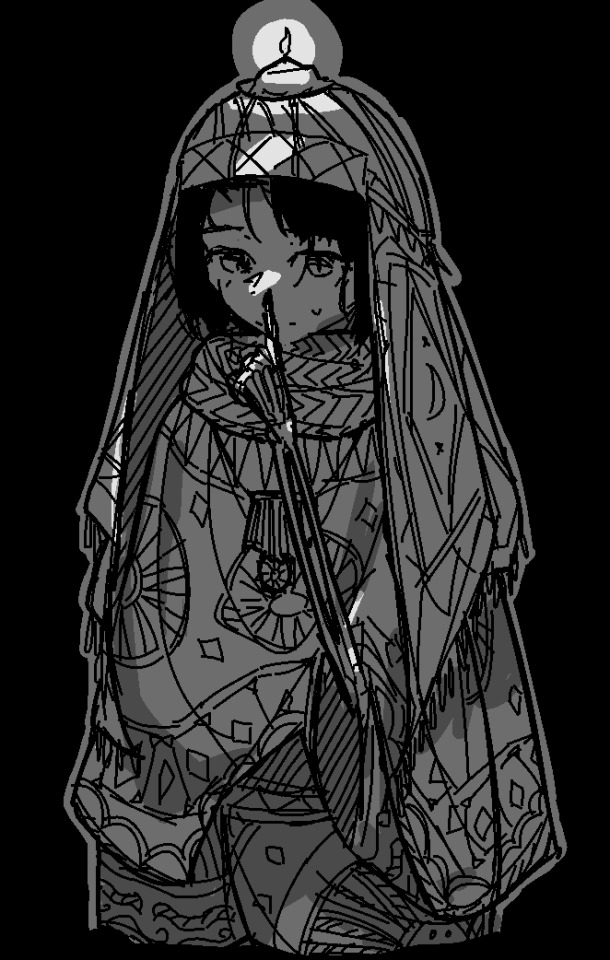
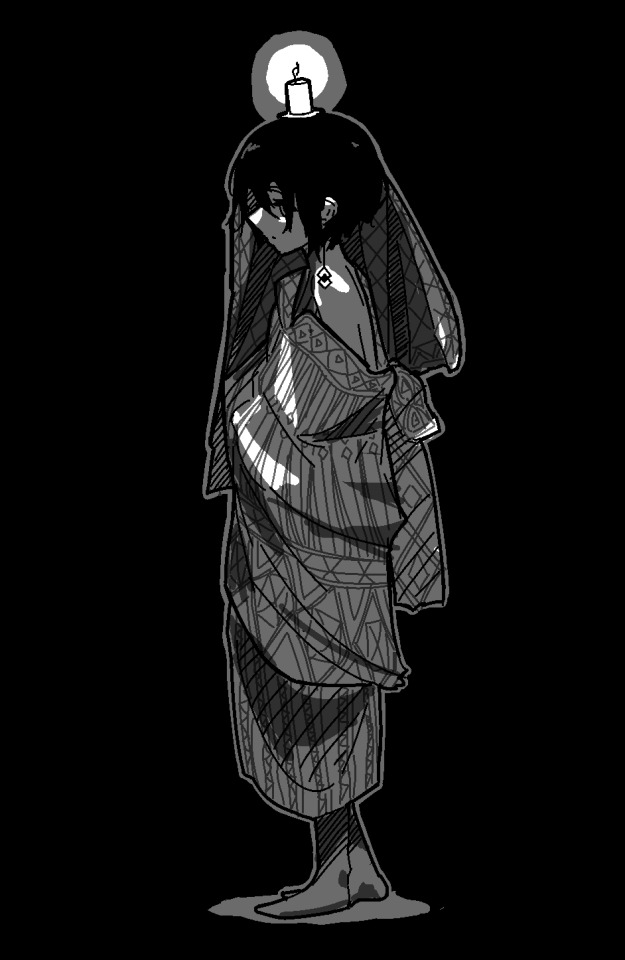


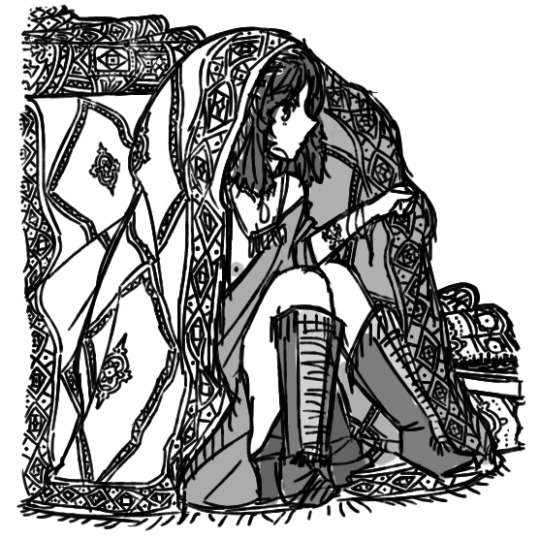

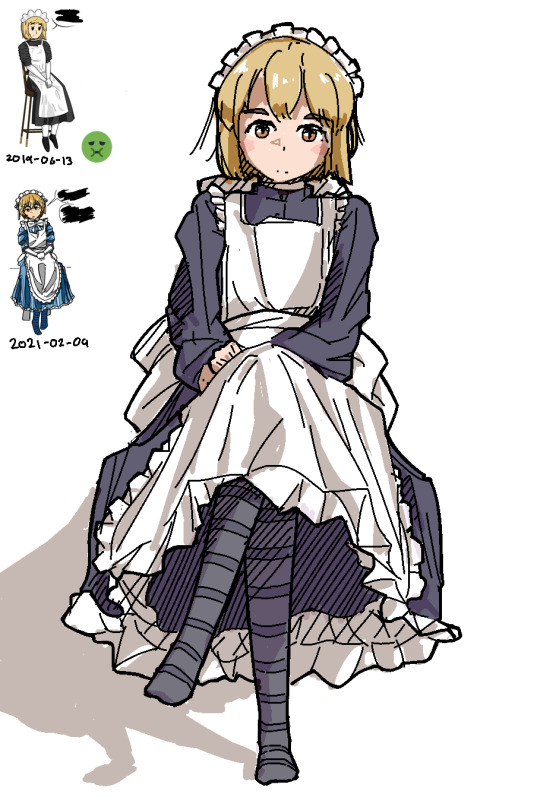


hello, i'm mark (he/him) and i draw anime art, persian rugs, and monochrome sovietwave. i made a tumblr account in case i need to jump ship from twitter, since it seems it might shut down. above is a small dump of some art i've done
you might have seen some of it before on Astrophysics (the musician) youtube videos, thumbnails, album covers, etc. he makes great music and i was actually a fan of his much earlier than i became an artist, so go check him out. besides that, my commissions are open to anyone (and are dirt cheap), so don't hesitate, i don't bite!!
i love androgyny, space, and cats, and i'm actually a game developer and programmer rather than an artist, but i seem to have tricked people into liking my art so that's what people know me for.
feel free to speak to me in any language but english (i speak them all) (i bet you think i'm joking)
3 notes
·
View notes